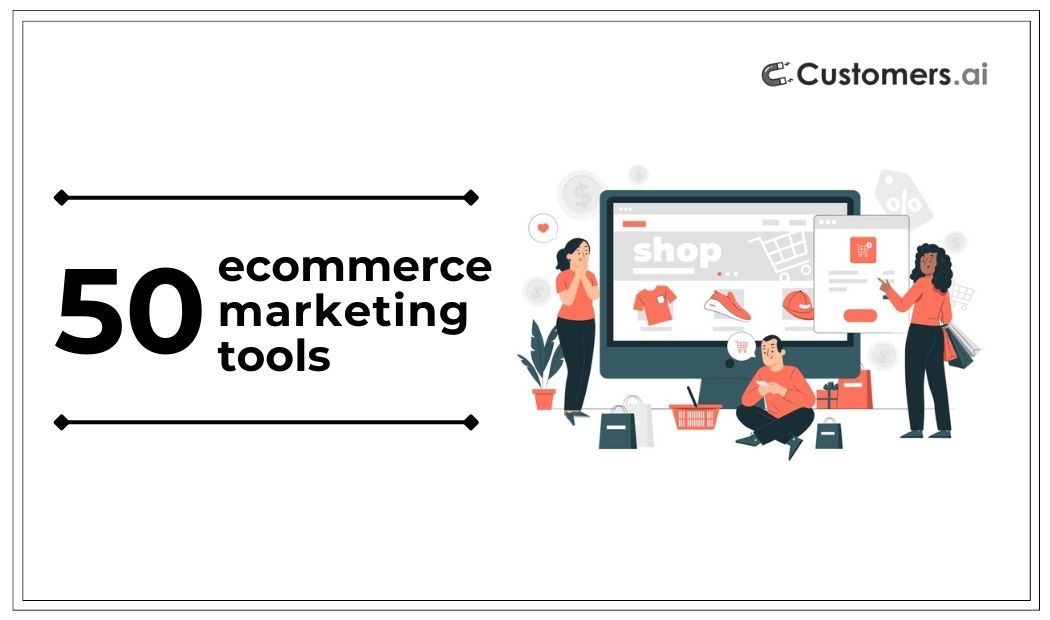Online spending has skyrocketed and with online retail revenue predicted to hit $1.1 trillion this year and $1.5 trillion by 2028, there is no slowing down.
For ecommerce retailers, this opens up a huge opportunity.
But to capitalize on this exponential growth, ecommerce stores must be optimized and they must be agile. After all, technology changes fast, user expectations change fast, and those who don’t adapt, won’t succeed.
To help you stay ahead of the game and build a best-in-class ecommerce stack, we have put together a list of ecommerce tools that will help ensure your business is ready to rock.
From ecommerce platforms to cart abandonment solutions and brand advocacy platforms, we have named some of the best of the best when it comes to ecommerce.
Dive into to see which ecommerce tools will help you save time and money. We have 50 different tools across 17 different categories:
- Ecommerce Platforms
- Referral & Influencer Marketing Tools
- Cart Abandonment Tools
- Email Automation Tools
- Website Optimization Tools
- Personalization Tools
- Analytics Tools
- SMS Automation Tools
- AI Marketing Tools
- Facebook Remarketing Tools
- Subscription Management Tools
- Review Management & Loyalty Tools
- SEO Tools
- Customer Service Tools
- PR & Media Tools
- Social Media Marketing Tools
Ecommerce Platforms
Ecommerce platforms are like the digital heartbeats of online stores, offering everything businesses need to effortlessly showcase and sell their digital products, ensuring a smooth and enjoyable shopping journey for customers. It’s important that the platform you choose fits not only your existing needs, but your future needs as well. Your platform should grow with you.
Ecommerce Tool #1 – Shopify Ecommerce Platform
Shopify makes starting a business easy. Their platform has everything from hosting and design to fulfillment and accounting.
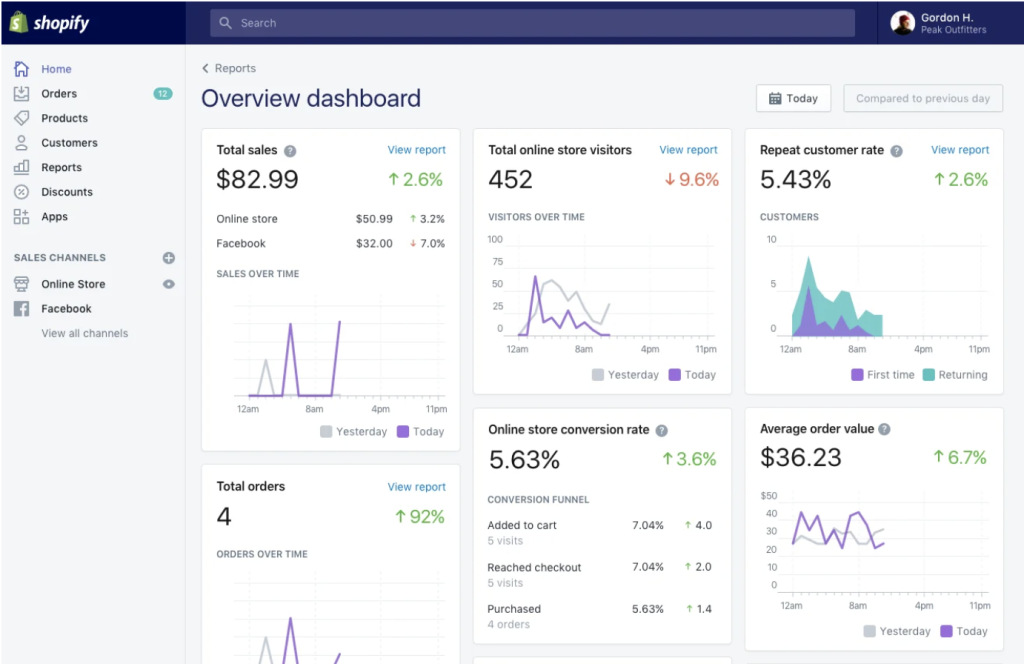
What makes Shopify so great is that it works for businesses of all sizes. Its user-friendly interface ensures beginners can swiftly set up and customize their digital storefronts while at the same time simplifying inventory management, order processing, and payment transactions.
Shopify also has a robust suite of marketing tools, analytics, and third-party app integrations, which helps merchants expand their reach, enhance customer engagement, and ultimately foster sustainable growth in the competitive ecommerce landscape.
See how Customers.ai integrates with Shopify.
Ecommerce Tool #2 – WooCommerce Ecommerce Platform
WooCommerce is a WordPress-based ecommerce platform that is made for businesses of all sizes and includes everything from payments to channel integrations to shipping and more.
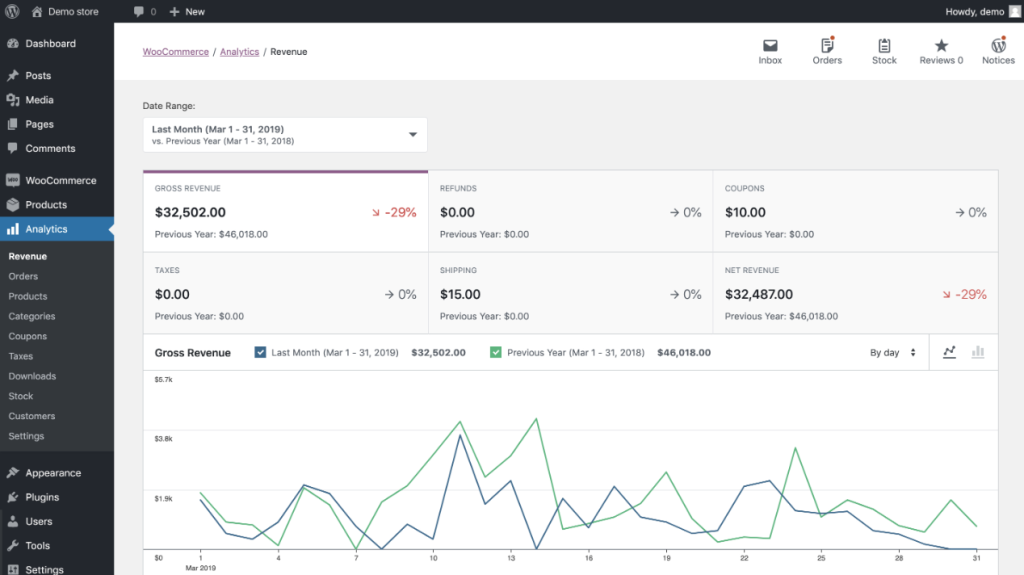
Known for its seamless integration with WordPress, WooCommerce offers a familiar environment for users to effortlessly create and manage their online stores. An open-source platform, Woo provides businesses with the flexibility to tailor their websites to specific needs, from product showcasing to checkout processes.
Woo also has a ton of extensions and themes, enabling scalability and adaptability and empowering ecommerce stores to not only establish a robust online presence but also to evolve and grow.
Ecommerce Tool #3 – BigCommerce Ecommerce Platform
BigCommerce is an enterprise ecommerce platform that features functionality like web hosting, merchandising, and more.
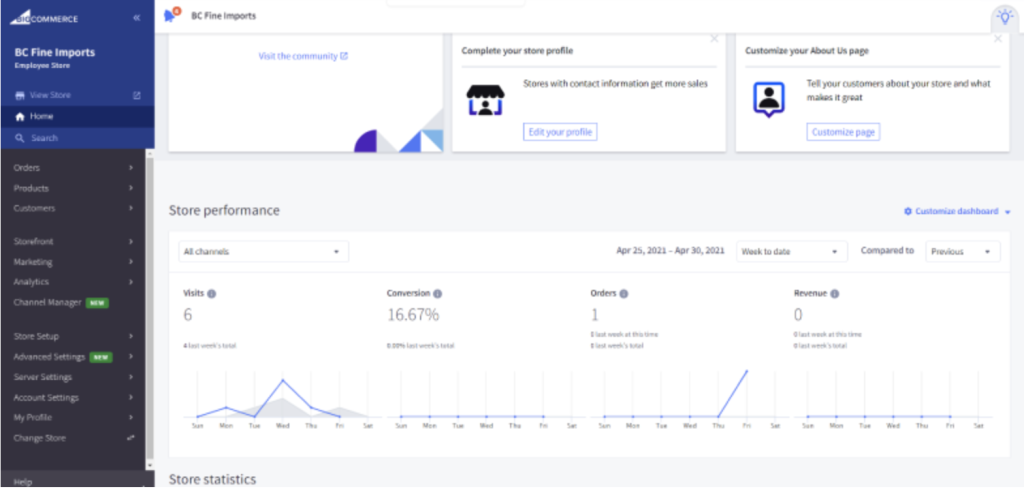
Inventory management and secure payment processing capabilities streamline operations. Additionally, the platform is equipped with tools for SEO, multi-channel selling, and analytics.
Due to its robust features built for enterprise-size organizations, BigCommerce stands out as a dynamic ecommerce platform.
Referral & Influencer Marketing Tools
According to Insider Intelligence, brands will spend an estimated $7.14 billion on influencer-related marketing campaigns in 2024. Why? Because referral and influencer marketing serves as an indispensable way for ecommerce businesses to harness the power of word-of-mouth and expand brand reach.
Ecommerce Tool #4 – Referral Candy Referral Generation Platform
ReferralCandy is a referral-generating platform that gets your customers to tell their connections about your product and service. And it does so by incentivizing customers to make product suggestions on your company’s behalf.
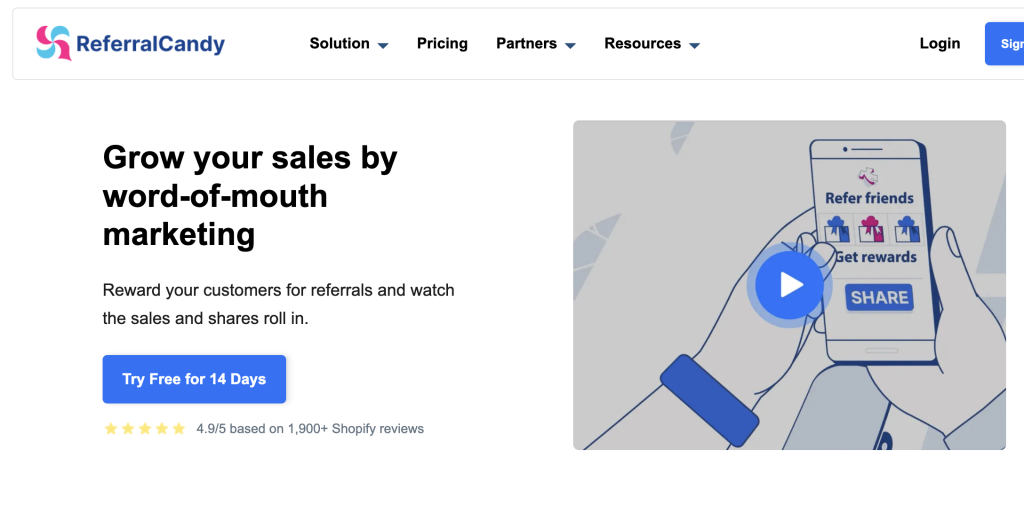
With Referral Candy, when a customer buys something from your ecommerce store, they automatically get a referral code that they can easily share with their friends and family. And when a friend of theirs makes a purchase with that referral code, the friend gets a discount on their purchase and the referrer earns rewards from your online store.
ReferralCandy is best for small to medium-sized businesses that don’t have the budget for designers and programmers to create custom web pages or custom referral programs.
Ecommerce Tool #5 – Social Snowball Affiliate & Referral Platform
Social Snowball is an affiliate tracking and referral tool built for ecommerce businesses that use Shopify.
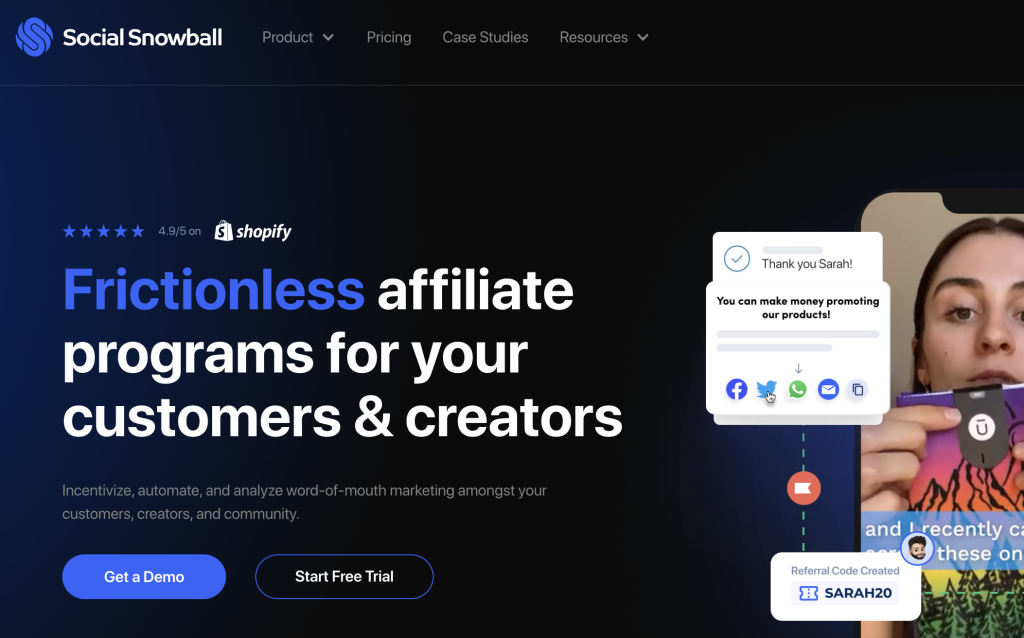
Social Snowball helps ecommerce stores recruit new customers as affiliates, automate incentives, track attribution and ROI, and manage multiple affiliate programs in one place.
It even manages the payout process, ensuring everything is in one place.
Ecommerce Tool #6 – Grin Influencer Marketing Platform
Grin is an ecommerce influencer marketing platform, that helps find, recruit, and nurture influencer relationships.

Grin seamlessly integrates with major ecommerce platforms like Shopify, Magento, WooCommerce, and Salesforce Commerce Cloud, simplifying product seeding and payments.
Additionally, its compatibility with various social media networks and communication tools enables businesses to discover, recruit, and manage influencers across various channels, allowing for targeted outreach to existing customers.
Ecommerce Webinar

Beyond Abandoned Cart to Abandoned Product View Revenue
with Email Deliverability Hacks & AI Tools
Cart Abandonment Tools
We know that the average cart abandonment rate across industries is ~70%, making cart abandonment tools a necessity in your ecommerce stack. Cart abandonment tools recover potential lost sales, thereby enhancing conversion rates and maximizing revenue opportunities.
Ecommerce Tool #7 – Website Visitor ID X-Ray Pixel for Cart Abandonment
Website Visitor ID X-Ray pixel is a website visitor identification tool that allows you to identify anonymous visitors on your website and capture the names and email addresses of site abandoners.
The downfall of cart abandonment is that unless someone fills out a form, you don’t know who they are. With website visitor identification, that changes and you can capture those who left their cart and can get ahead of pre-cart abandonment.
To install the Website Visitor ID X-Ray Pixel, sign up (for FREE!), go to your dashboard, and navigate to My Automations.
Select + New Automation and get your pixel. We have easy install options for Google Tag Manager, WordPress, and Shopify, or you can install the pixel manually.
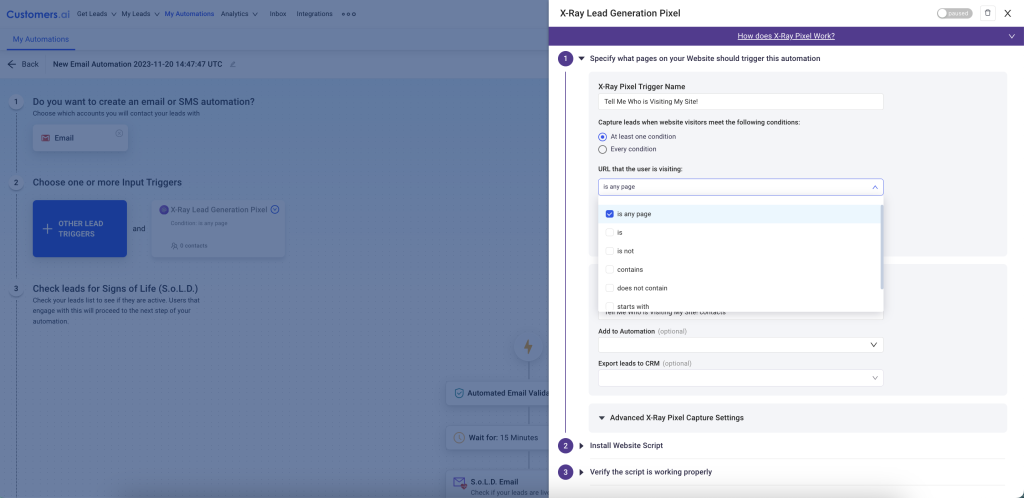
Ecommerce Tool #8 – CartStack Abandoned Cart Solution
CartStack is one of the top shopping cart abandonment solutions around, offering real-time cart recovery and catering to ecommerce businesses of all sizes.
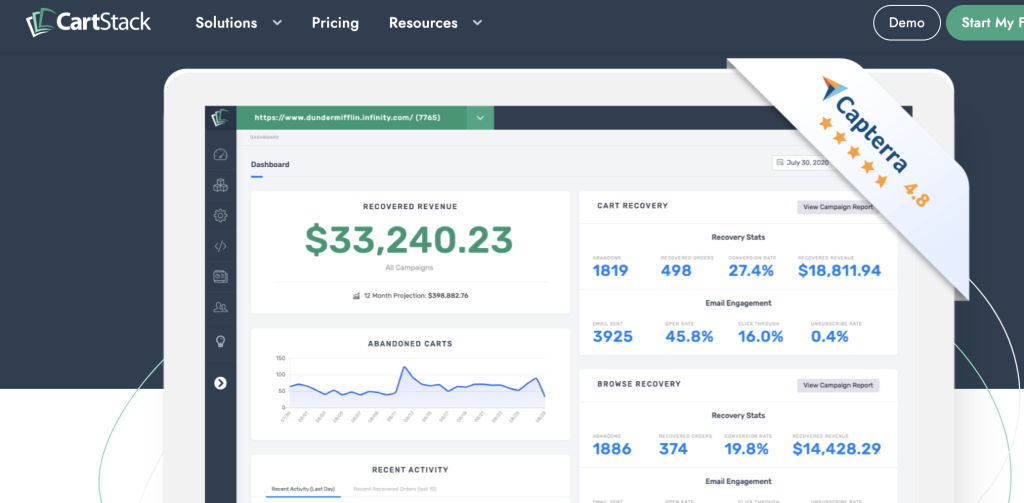
With features like real-time tracking, dynamic content, and customizable messaging, CartStack not only identifies abandoned carts but also entices customers with compelling offers, effectively recovering sales and optimizing conversion rates for ecommerce businesses.
Email Automation Tools
Email marketing automation tools are essential for ecommerce businesses, streamlining and enhancing communication by automating the creation, scheduling, and delivery of targeted email campaigns, ultimately nurturing customer relationships, driving engagement, and boosting sales with personalized and timely content.
Ecommerce Tool #9 – Klaviyo Email Automation Platform
Klaviyo is a marketing platform that helps eCommerce store owners deliver a more personalized experience for their customers. This includes email marketing automation.
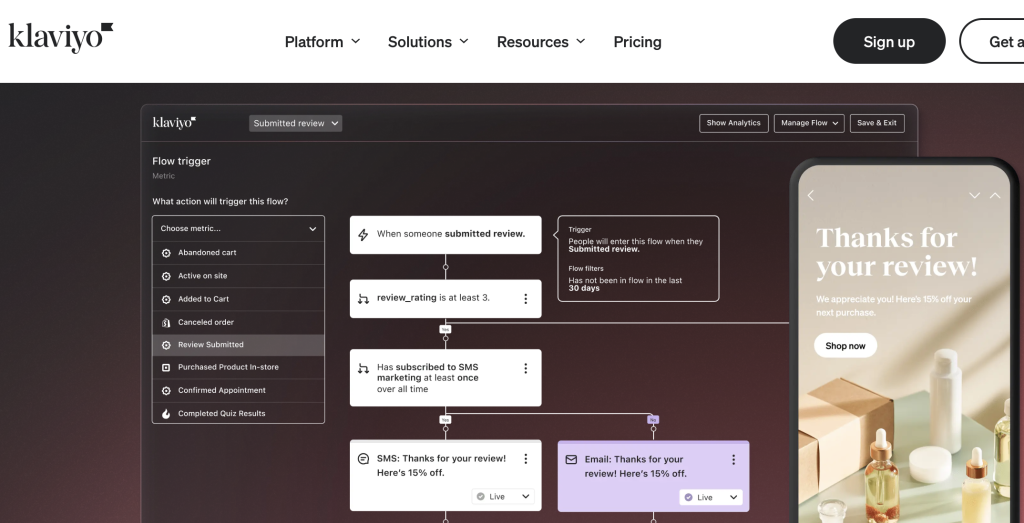
While email marketing automation is just one of the things Klaviyo does, it stands out in our toolset due to it’s advanced segmentation capabilities. This allows for personalized communication, behavioral tracking to trigger timely emails, dynamic content creation tailored to individual preferences, and automated flows, including welcome series and cart recovery.
Its seamless integration with popular ecommerce platforms like Shopify ensures a smooth workflow, empowering ecommerce businesses to leverage data for highly effective marketing campaigns.
See how Customers.ai integrates with Klaviyo.
Ecommerce Tool #10 – Mailchimp Email Automation Platform
Mailchimp is an email marketing and automation platform designed for small, medium, and enterprise businesses.
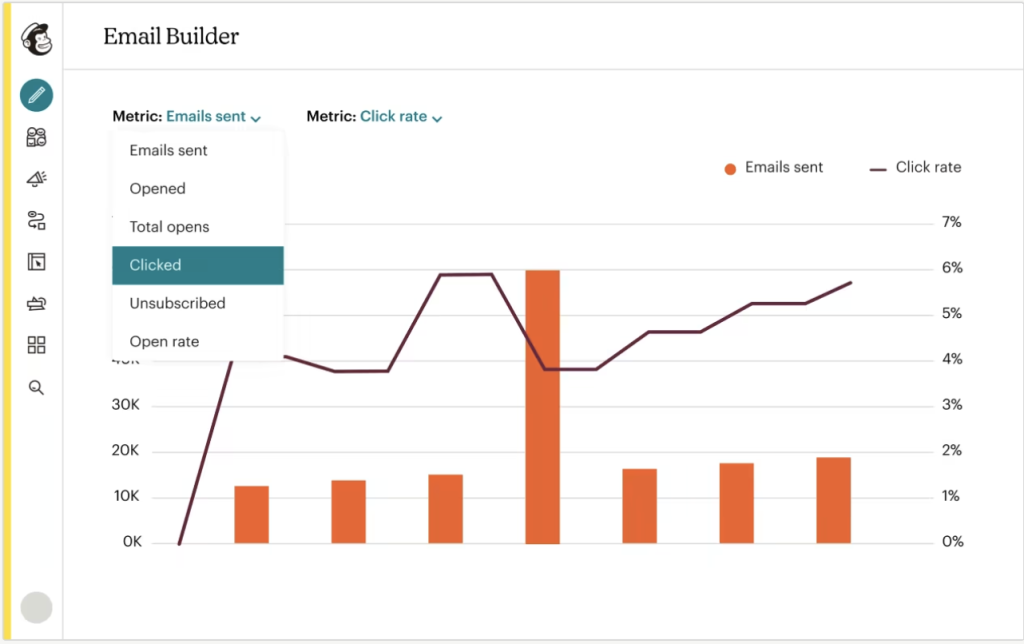
One of the reasons people love Mailchimp is its user-friendly interface and robust features.
With Mailchimp, businesses can easily design and deploy personalized campaigns, leverage advanced segmentation, and implement automated workflows, making it an ideal solution for streamlining communication, nurturing customer engagement, and driving successful email marketing strategies.
See how Customers.ai integrates with Mailchimp.
Ecommerce Tool #11 – SendGrid Email Automation Platform
Sendgrid is a powerful email marketing platform that has become a must-have tool for start-ups and eCommerce businesses of all sizes.
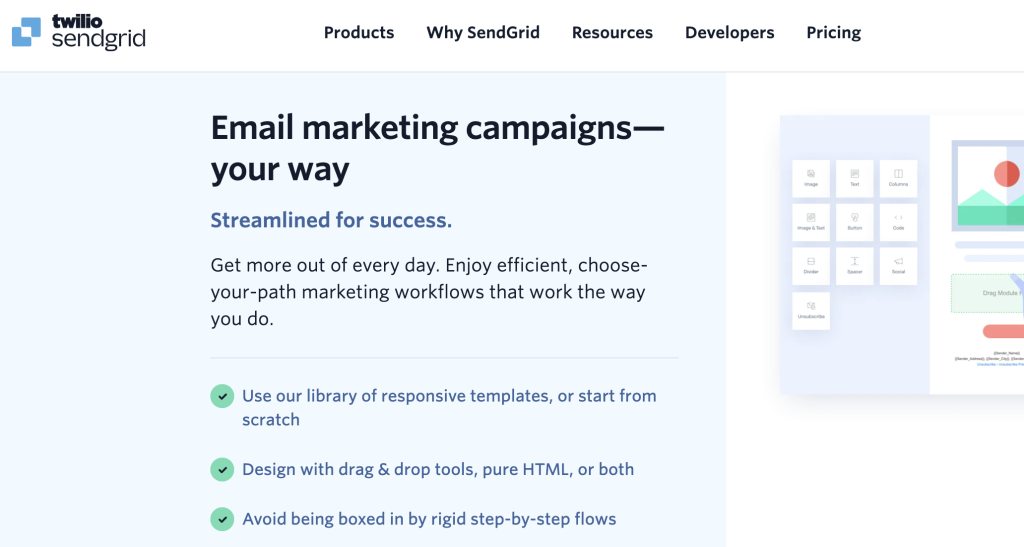
SendGrid is really renowned for its reliability and scalability. SendGrid’s advanced deliverability tools, including real-time analytics and ISP feedback loops, contribute to high email deliverability rates, ensuring that marketing messages successfully reach intended recipients’ inboxes.
Along with features like delivery management, detailed analytics, and customizable templates, SendGrid makes email marketing campaigns easy.
See how Customers.ai integrates with SendGrid.
Email Deliverability Hacks:
Unlocking Inboxes


HOSTED BY
Larry Kim
Founder and CEO, Customers.ai
Website Optimization Tools
Website optimization tools are essential for ecommerce businesses, providing the necessary means to enhance user experience, maximize site performance, and boost conversions by identifying and addressing inefficiencies, improving page load times, and ensuring a seamless online journey for visitors.
Ecommerce Tool #12 – Lucky Orange Website Optimization
Lucky Orange is a conversion optimization tool designed to help ecommerce businesses track and engage with visitors.
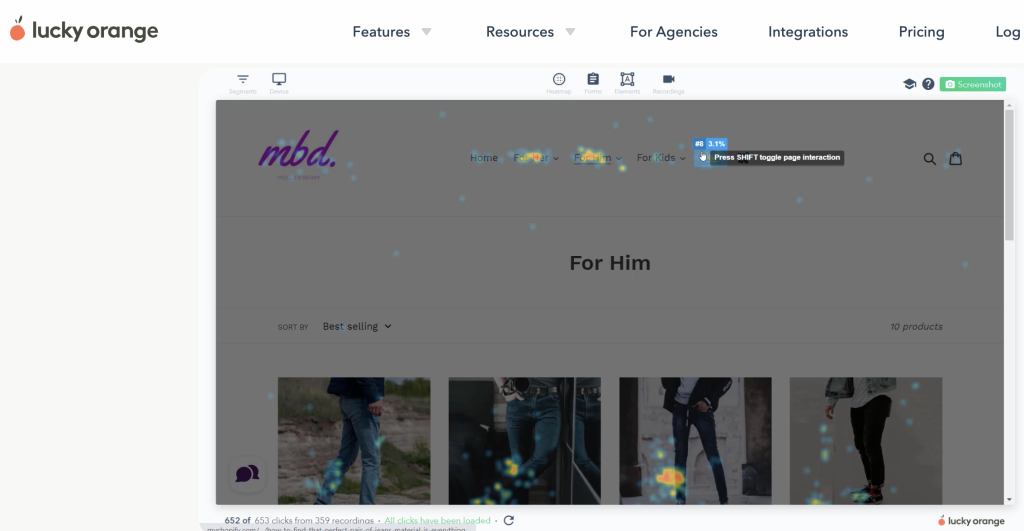
Lucky Orange offers real-time insights through features like heatmaps, surveys, session recordings, and conversion funnels, allowing businesses to understand user behavior, identify pain points, and make data-driven improvements that significantly enhance website performance and user experience.
“In the fast-paced world of e-commerce, Lucky Orange is your backstage pass to see how visitors really use your website. Study behavior to remove conversion blockers and take your store to the next level.”
– Molly Staats, Director Of Strategic Partnerships at Lucky Orange
Ecommerce Tool #13 – Searchspring Site Search & Merchandising
At the heart of it, Searchspring is an ecommerce tool that helps online retailers optimize their site search results and website merchandising operations.
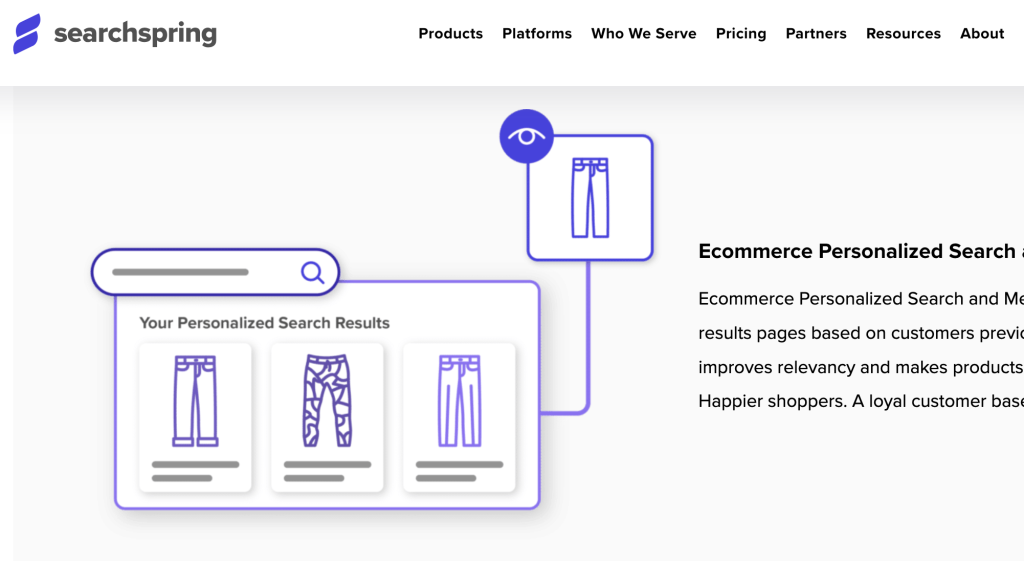
With its intelligent search capabilities, including autocomplete and spell correction, Searchspring helps enhance the user experience and in turn, improve conversions.
The platform’s merchandising tools allow retailers to curate personalized shopping experiences, optimize product listings, and utilize intelligent recommendations while the analytics provide valuable insights on how everything is performing.
Ecommerce Tool #14 – Optimizely Digital Experience Platform
Optimizely is a digital experience platform that gives ecommerce teams the ability to fully manage and optimize their digital presence.
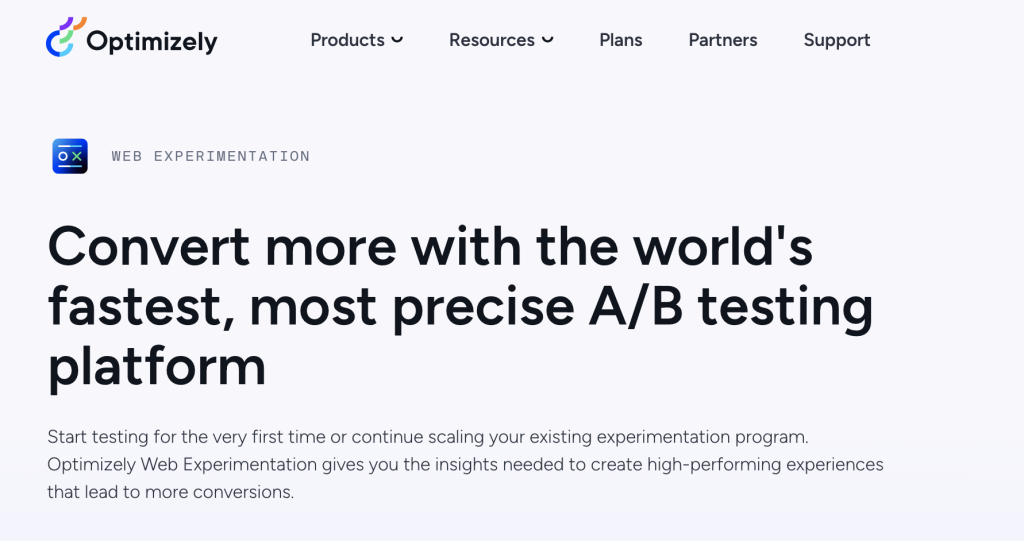
Optimizely does a lot of things but two of the main selling points are its robust personalization features that enable businesses to tailor content to individual user preferences and the experimentation platform. Whether you are just starting testing or working to scale your existing experimentation program, the platform makes it easy.
With its data-driven approach, Optimizely provides actionable insights, empowering ecommerce businesses to continuously refine their strategies, improve user satisfaction, and achieve long-term success.
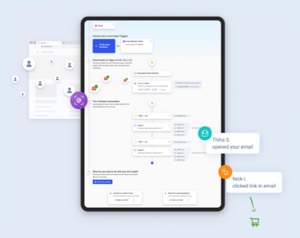
See Who Is On Your Site Right Now!
Turn anonymous visitors into genuine contacts.
Try it Free, No Credit Card Required
Personalization Tools
Personalization tools provide the means to tailor online experiences, content, and promotions to individual preferences, enhancing customer engagement, fostering brand loyalty, and driving higher conversion rates in the competitive digital marketplace. Everything ecommerce businesses need and want.
Ecommerce Tool #15 – Justuno Engagement & Personalization
Justuno is a CRO platform that provides seamless personalized experiences, grows SMS and email subscriber lists, and provides an interactive site experience.
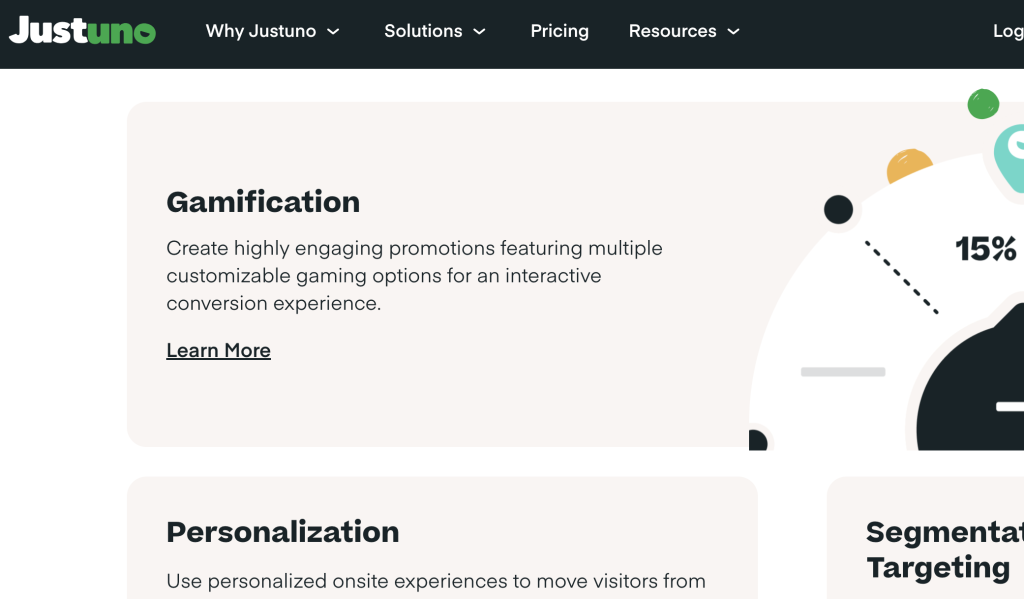
Through advanced personalization features, Justuno allows ecommerce businesses to create tailored pop-ups, banners, and promotions that resonate with individual visitors, fostering a more personalized and engaging online experience.
Justuno’s robust targeting capabilities, including audience segmentation and behavioral triggers, also help deliver timely and relevant messages, resulting in improved conversion rates and a more customized journey for their customers.
Ecommerce Tool #16 – Personyze Personalization Platform
Personyze is also a product discovery software which provides detailed analytics, allowing businesses to refine their personalization strategies.
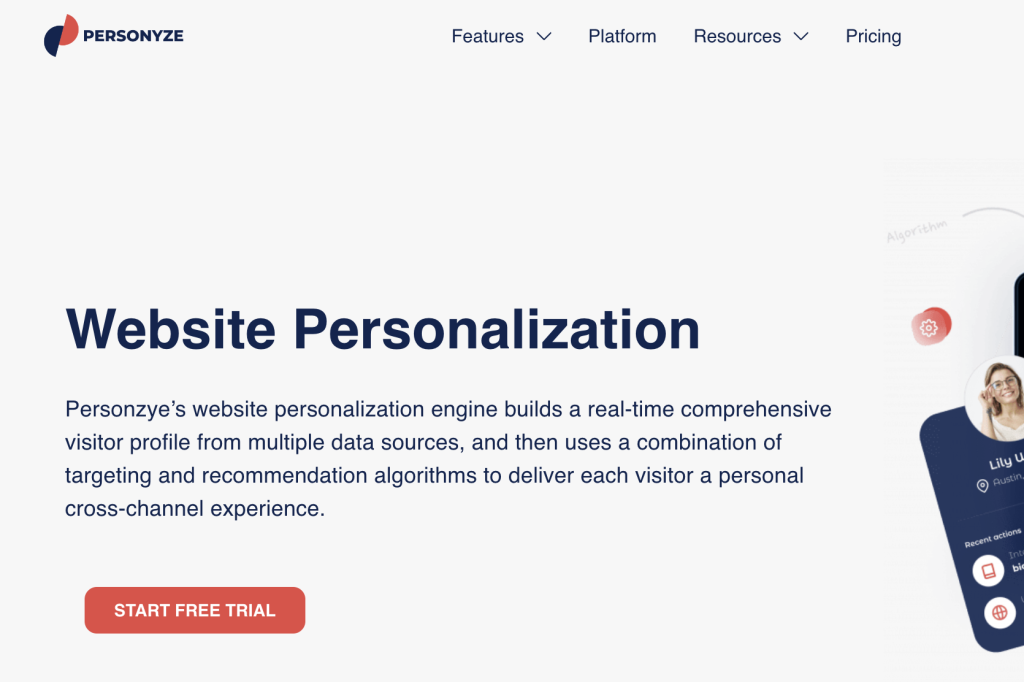
With features such as advanced AI-driven recommendations, dynamic content customization, and targeted messaging, Personyze gives ecommerce businesses the ability to create highly personalized experiences.
Personyze also helps with product discovery and provides detailed analytics, allowing businesses to refine their personalization strategies.
Analytics Tools
Analytics tools provide the critical capability to collect, analyze, and interpret data, enabling informed decision-making, optimizing strategies, and uncovering actionable insights that drive growth, enhance user experiences, and maximize overall performance in the ecommerce marketplace.
“Having technology that tracks attribution at multiple touch points down the full marketing funnel will be critical for 2024. Especially with the advent of GA4, which has different, less comprehensive attribution modeling compared to UA, having a tool that analyzes how marketing channels work together, not just at a single point or last click, will be key to influencing and optimizing conversions.”
– Courtney Herb, Director of Brand Marketing at AdRoll
Ecommerce Tool #17 – Triple Whale Data Platform
Triple Whale is an AI platform that centralizes all of your eCommerce data into one platform, enabling you to track key metrics and better understand attribution.
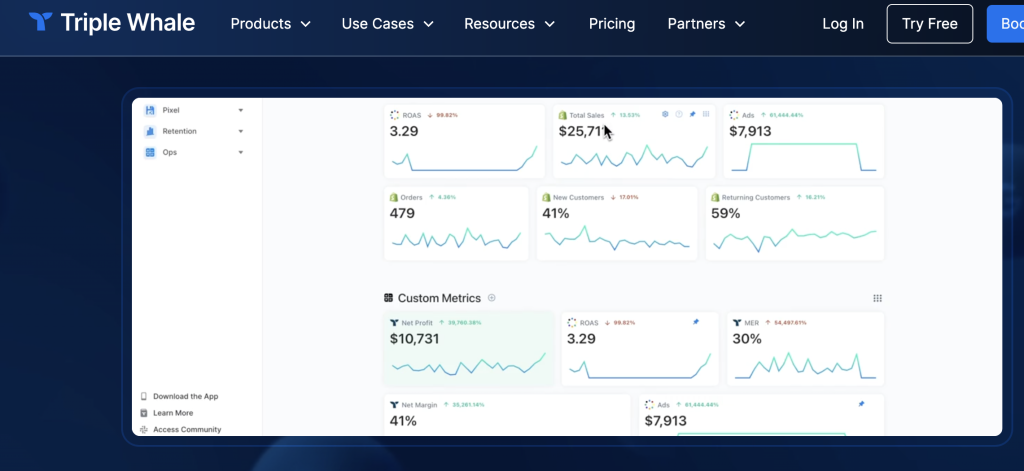
We talk a lot about the loss of cookies so we love that Triple Whale helps solve the cookie and attribution problem by using first-party data to connect ad clicks and conversions with greater precision.
Triple Whale excels in tracking the customer’s journey, providing ecommerce businesses with comprehensive insights that help them to make data-driven decisions, optimize marketing spend, and strategically allocate resources for maximum impact throughout the customer lifecycle.
Ecommerce Tool #18 – Analyzify GA4 & Ads Tracking App
Built for Shopify, Analyzify simplifies data collection for your store, giving you an easy way to manage your pixels in one place.
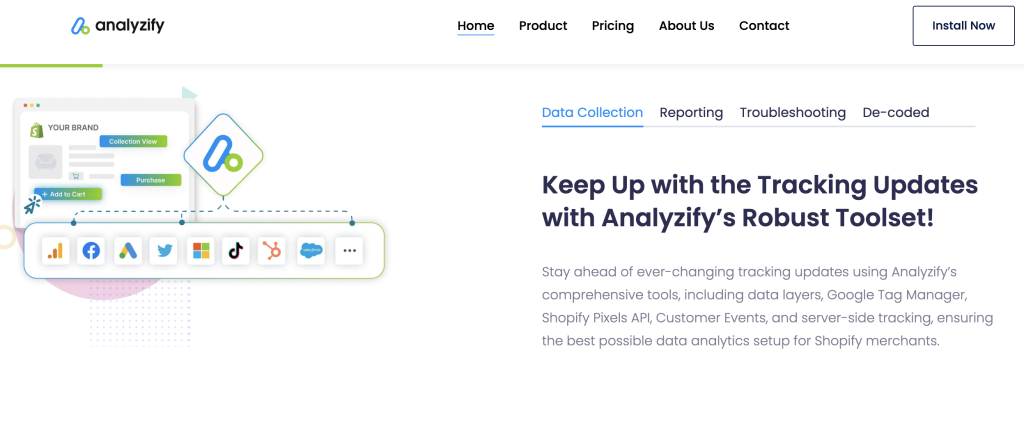
With GA4 making attribution and reporting unnecessarily challenging, Analyzify brings together a lot of the data you want to see to make better marketing decisions.
Along with GA4 integration, Analyzify includes Google Ads Conversion Tracking and Dynamic Remarketing capabilities, along with a professionally curated data analytics setup, troubleshooting systems, and it integrates with other platforms including Facebook Pixel, Bing, TikTok, Pinterest, and Clarity.
Convert Website Visitors into Real Contacts!
Identify who is visiting your site with name, email and more. Get 500 contacts for free!
SMS Automation Tools
SMS automation tools offer ecommerce businesses another way to engage customers. Instead of email, phone calls, or social, SMS gives you the ability to target users through automated text messages, enhancing communication, and fostering loyalty by delivering timely updates, personalized promotions, and transactional notifications directly to their mobile devices.
Ecommerce Tool #19 – Recart SMS Automation Platform
Recart is a fully managed SMS platform that uses AI to help ecommerce merchants reach their customers and sell more online.
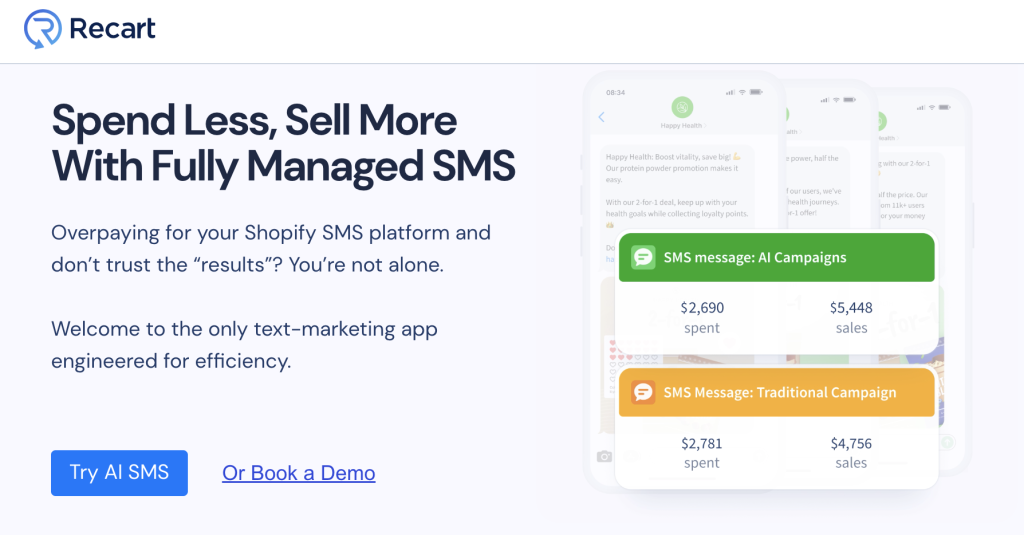
With its SMS capabilities and AI integration, Recart delivers personalized communication that creates and sends tailored messages based on individual purchasing behavior. Messages can include targeted promotions, cart abandonment reminders, post-purchase follow-ups, and more.
We also love the Recart support team. While many companies charge you for support, Recart gives you a dedicated SMS expert to help you grow your ecommerce business through SMS.
Ecommerce Tool #20 – Sendlane Email & SMS Platform
Sendlane is a marketing automation software that unifies email, SMS, and review management for ecommerce businesses
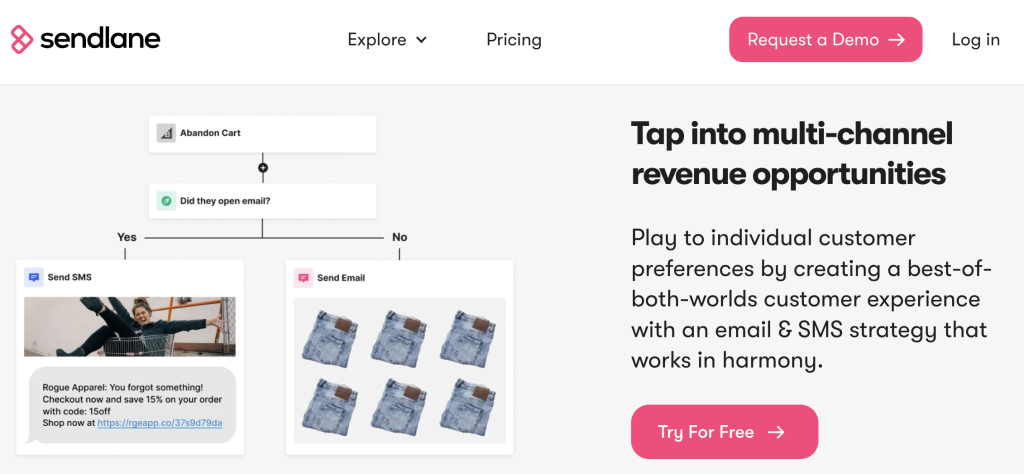
While Sendlane does many things, for the purposes of our list, we are going to focus on their SMS capabilities, which we love. Marketers can create and automate personalized SMS campaigns using customer data – the result? Targeted promotions, product updates, and time-sensitive offers right to the phone.
We also like the platform’s intuitive interface, which when combined with advanced segmentation and automation features, makes it easy for businesses to use.
Ecommerce Tool #21 – Customers.ai SMS Automation
While we touched on the Website Visitor ID X-Ray pixel earlier in the list, Customers.ai also has the capabilities to create and send personalized SMS automation.
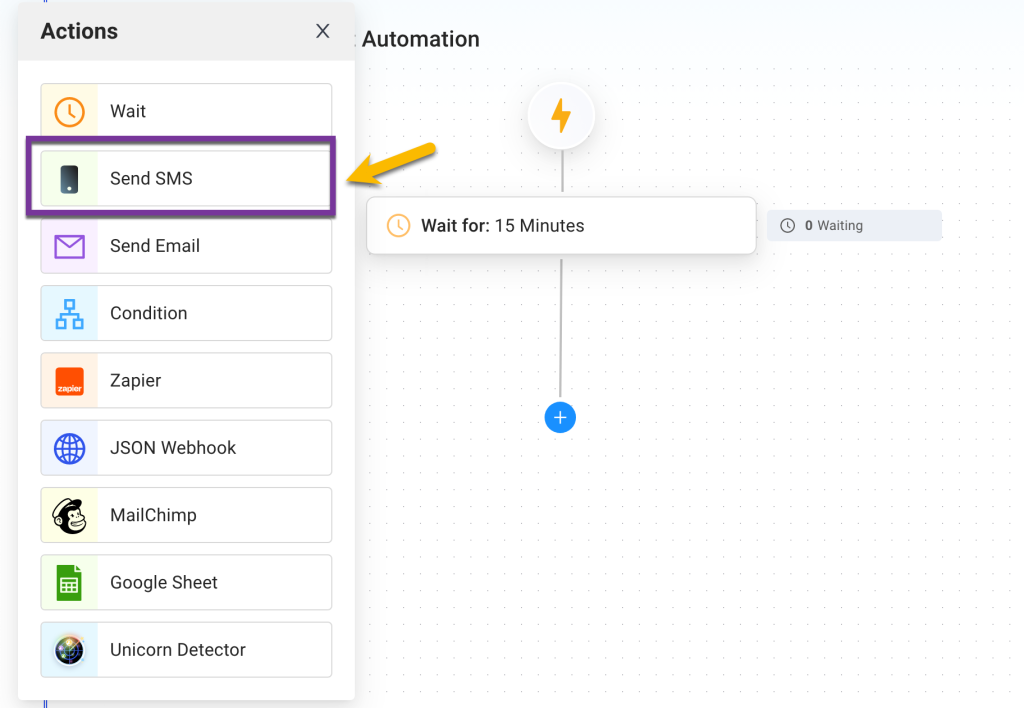
Our platform helps marketers engage customers with tailored promotions, order updates, and targeted messaging based on individual preferences and our dynamic segmentation and behavioral triggers enhance the precision of any SMS campaign.
AI Marketing Tools
AI marketing tools harness the power of artificial intelligence to analyze vast amounts of data, predict customer behavior, and automate personalized marketing strategies, giving ecommerce businesses a leg up when it comes to targeting, campaign effectiveness, and the overall customer experience.
“It may seem obvious, but effectively utilizing AI tools will be critical for 2024 and beyond. When 2023 brought AI into the limelight, it introduced us to the concept of working alongside AI, and using AI to amplify our own efforts.”
– Jonathan Maltz, Head of Marketing at AdScale
Ecommerce Tool #22 – Jasper AI Copilot
Jasper.ai is an AI-based tool created to assist content creators, marketers, and ecommerce businesses in crafting high-quality content.
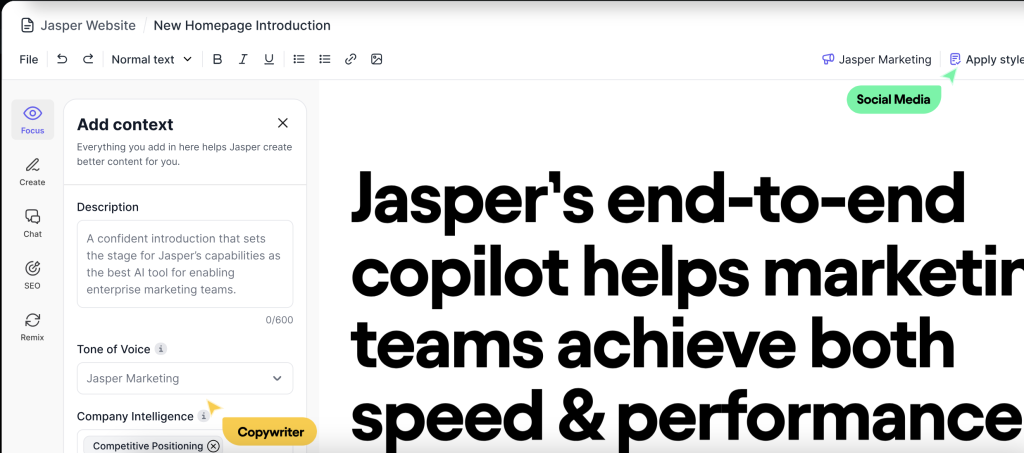
Jasper AI particularly excels in copywriting and content strategy. By utilizing advanced AI algorithms, marketers can quickly generate compelling and tailored product descriptions, ad copy, and social media content, saving time and ensuring consistency in brand messaging.
The predictive analytics are great for anticipating customer preferences and behaviors and giving marketers a way to craft highly targeted campaigns that resonate with their audience.
We also like that Jasper extends to various marketing channels, making it a valuable asset for comprehensive and effective integrated marketing campaigns.
Ecommerce Tool #23 – VSL AI Marketing Tool
VSL is AI software designed to help businesses create personalized and engaging content ranging from emails to ads to videos and social media updates.
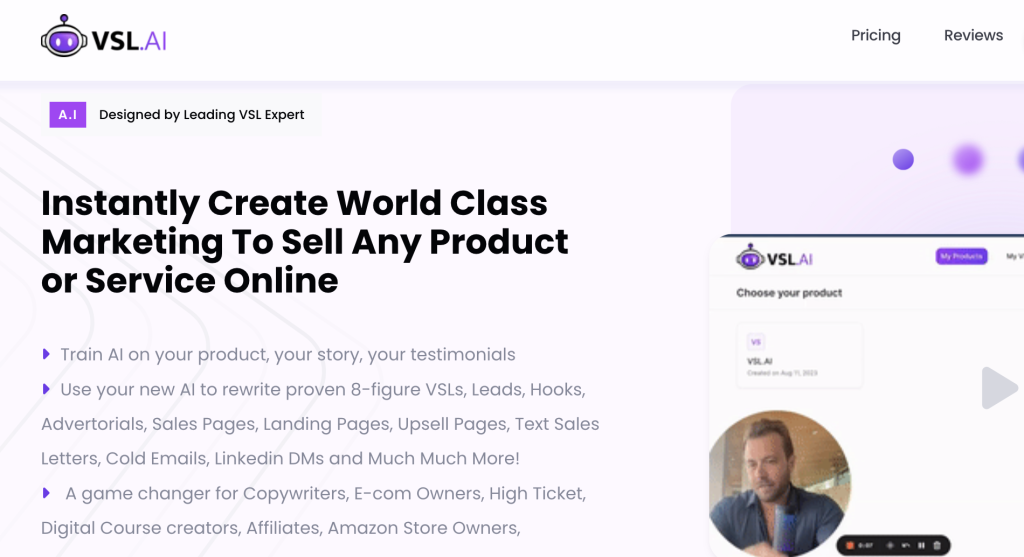
What we love the most is that VSL streamlines the process of creating compelling video scripts that work for sales, social, landing pages, etc. VSL’s ability to understand and mimic human language allows marketers to produce truly high-quality content.
Ecommerce Tool #24 – AdScale AI Advertising Platform
AdScale is an AI advertising platform designed to help digital marketers optimize advertising performance.
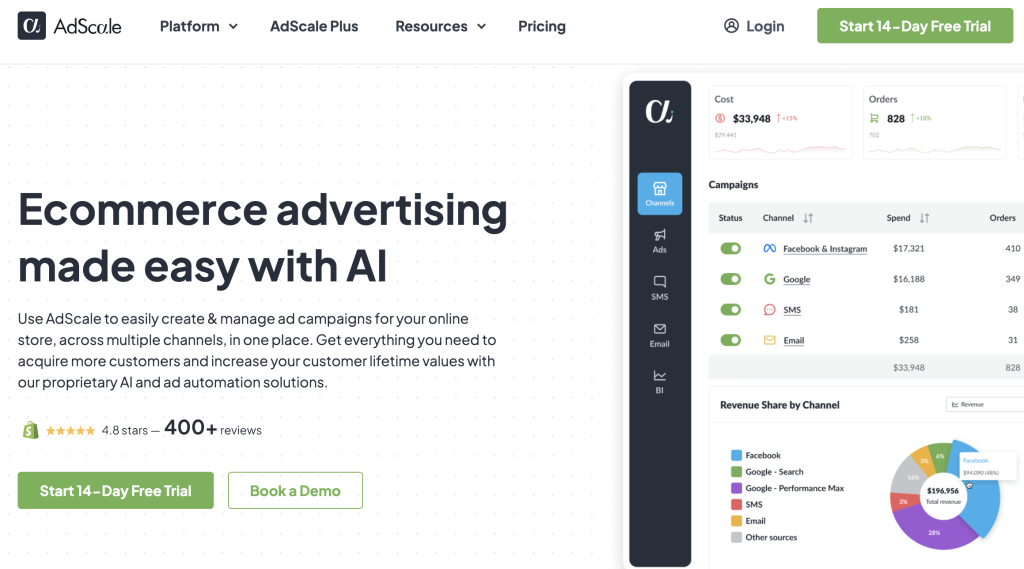
AdScale uses machine learning to enable automation and optimization of ads campaigns across Google Search, Google Shopping, Google Display, Facebook, and Instagram..
This includes the process of ad creation, targeting, bidding, and real-time data analysis to make quick adjustments.
AdScale’s AI capabilities not only streamline the advertising process but also contribute to improved targeting precision, cost-effectiveness, and overall campaign performance.
Ecommerce Tool #25 – Aidaptive Autonomous Intelligence Platform
Aidaptive is an intelligence platform designed to deliver personalized shopping experiences to ecommerce shoppers.
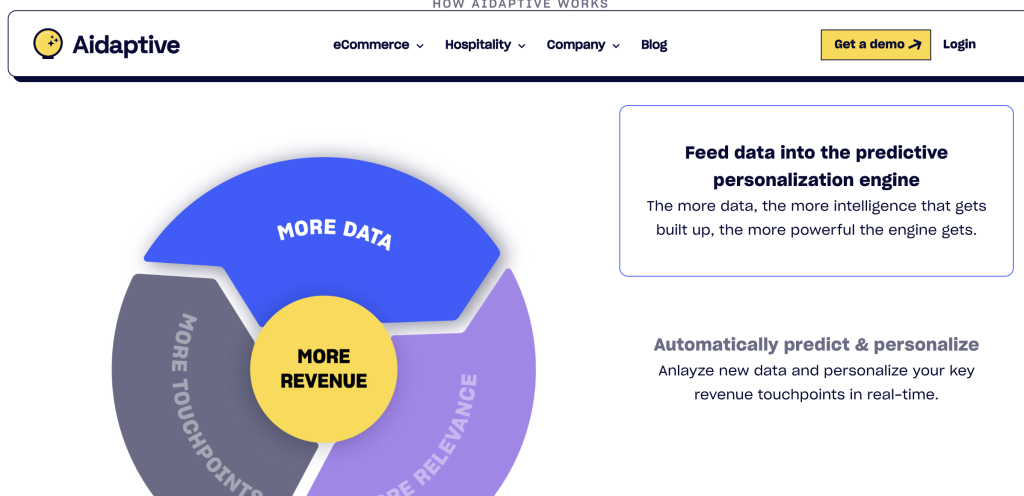
Aidaptive utilizes machine learning algorithms to optimize ecommerce websites and improve conversions. From personalized product recommendations to dynamic pricing strategies, Adaptive ensures a highly individualized journey for each visitor.
AI-Powered Advertising
How to Unlock AI and Lead Capture Tech for 10X Return on Ad Spend


HOSTED BY
Larry Kim
Founder and CEO, Customers.ai
Facebook Remarketing Tools
Facebook retargeting tools offer a strategic way to re-engage potential customers who have visited your website by delivering personalized ads. With Facebook retargeting, ecommerce brands can maximize brand visibility, improve conversion rates, and improve customer retention.
Ecommerce Tool #26 – AdRoll Growth Marketing Platform
AdRoll is an advertising platform that provides tools for creating, managing, and optimizing digital advertising campaigns, including those on Facebook.
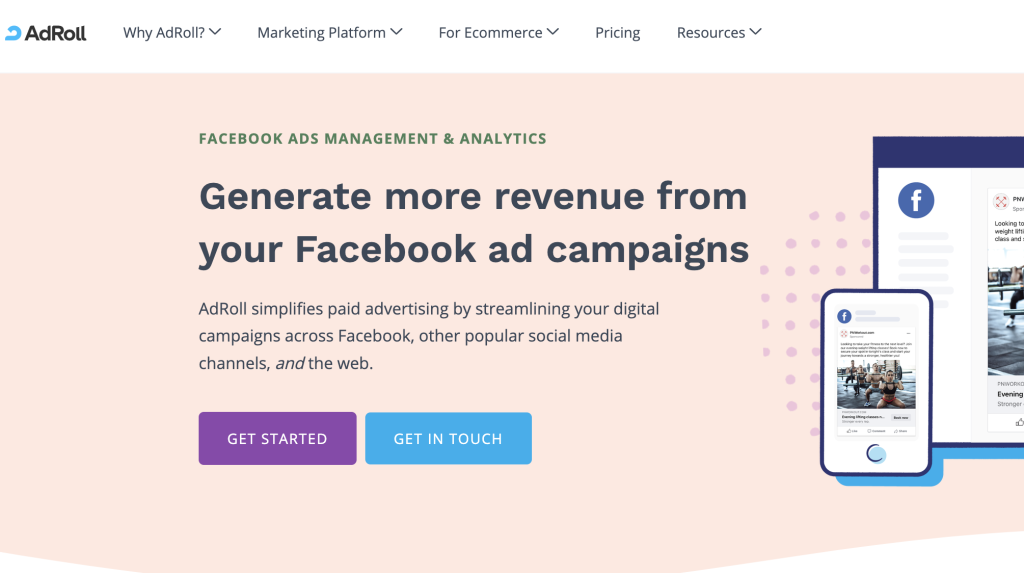
AdRoll’s Facebook retargeting capabilities are a standout feature and give ecommerce businesses a powerful tool to re-engage and convert potential customers.
AdRoll seamlessly integrates with Facebook and the platform’s advanced segmentation and dynamic ad creation enable businesses to tailor content based on users’ browsing history, preferences, and interactions, creating a highly targeted and effective retargeting strategy.
Ecommerce Tool #27 – Customers.ai Consumer Directory
We mentioned previously that Customers.ai can tell you exactly who is visiting your website and what pages they visit. These people make for the perfect retargeting audience and are the perfect way to grow our remarketing lists.
Additionally, our intent-based Consumer Directory can help you not only enrich leads data but also build your Facebook retargeting list with customers who fit your ICP.
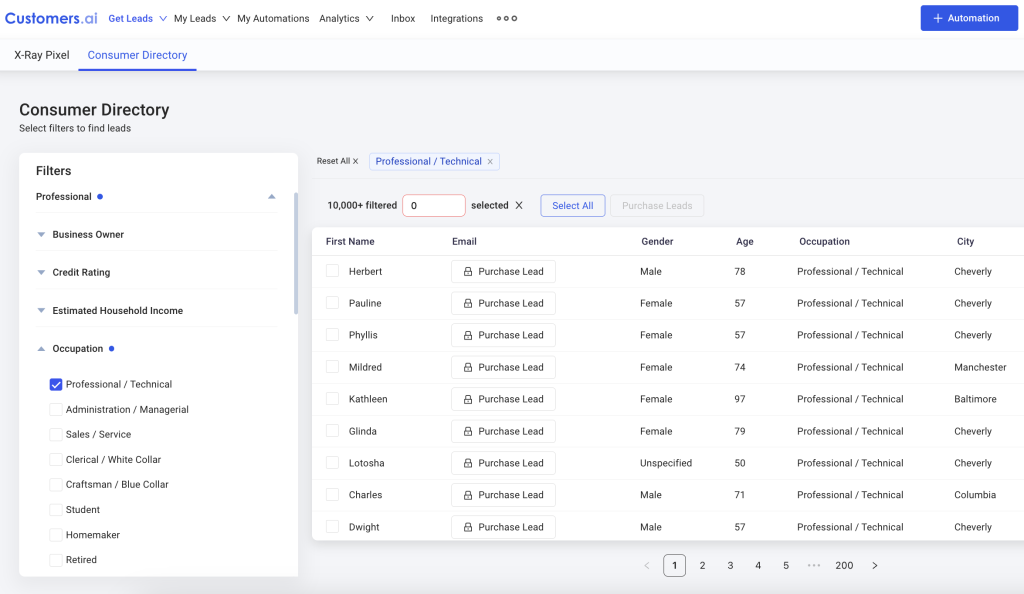
Facebook audiences are shrinking and with privacy changes continuing to roll out, the only way to grow your retargeting lists will to manually do so.
Subscription Management Tools
Subscription management tools provide a centralized platform to efficiently handle the complexities of subscription-based models, automate billing cycles, and optimize customer experiences. The result? Seamless subscription management and sustained revenue growth for ecommerce companies.
“As you enter 2024, your subscription tech should be the curator of unforgettable experiences. It should go beyond being a recurring order tool and orchestrate a personalized journey for each user. In the era of tailored content, pick your subscription partner that makes every subscription a handpicked adventure, and create a unique bond between your delighted audience & the brand.”
– Sakshi Jain, Head of Growth & Partnerships, Loop Subscriptions
Ecommerce Tool #28 – Loop Subscription Management Tool
Loop is a subscription management app built exclusively for Shopify stores to enable long-term subscription growth and keep users engaged.
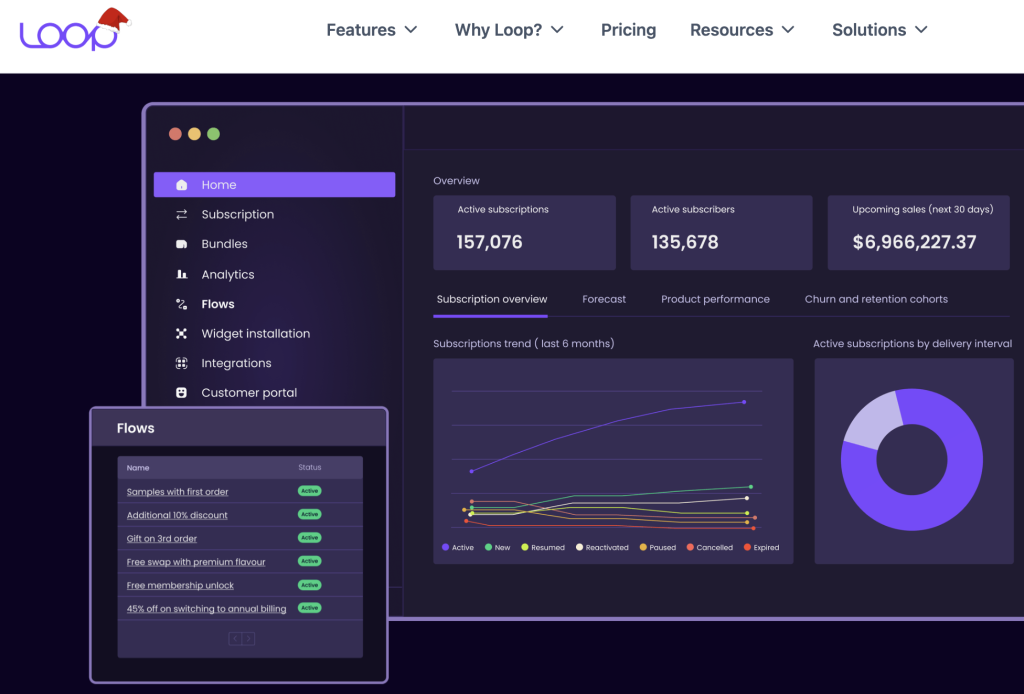
The Loop app offers seamless subscription setup and management, automates recurring billing cycles and ensures a hassle-free experience for both businesses and customers. Plus it has a super cool gamification feature that rewards users and lowers cancellation rates.
Along with your standard features like flexible subscription options, automated billing, and easy customization, we like that Loop’s user-friendly platform makes it easy to do all this in one place.
Ecommerce Tool #29 – Chargebee Subscription Management Tool
Chargebee is a subscription management and recurring billing tool that helps subscription businesses streamline their RevOps and scale subscriptions.
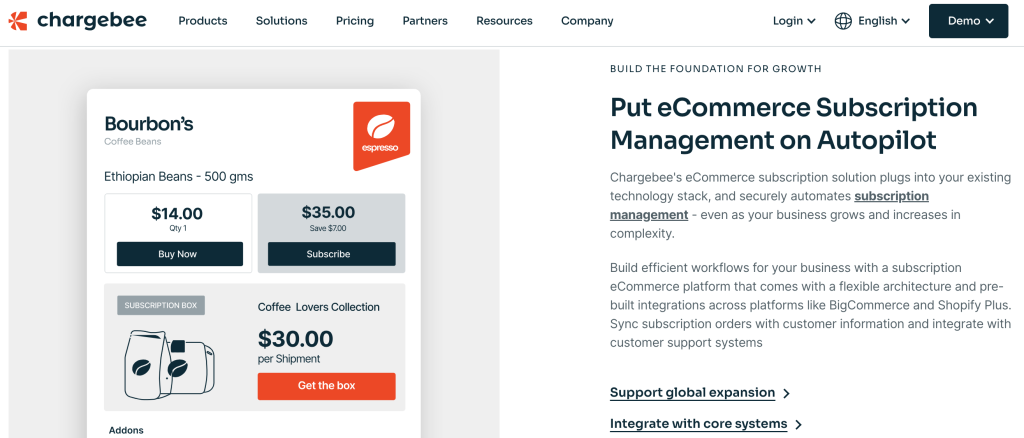
We like that Chargebee is uniquely designed to simplify complex billing scenarios for ecommerce businesses. Its flexibility in handling diverse pricing models, including tiered pricing and metered billing, sets it apart.
Chargebee’s automation features, such as invoicing and dunning management, ensure accuracy and reliability in subscription processes, helping businesses to scale efficiently while offering a seamless experience for customers.
Ecommerce Tool #30 – Recurly Subscription Management Tool
Recurly is a subscription management tool and recurring billing platform built for ecommerce companies.
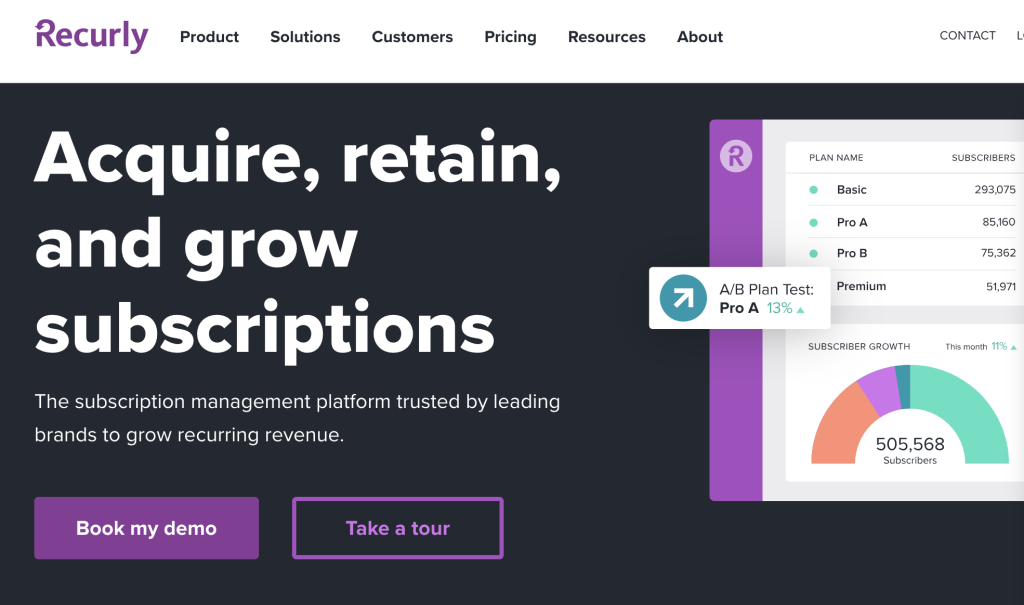
Recurly distinguishes itself as a leading subscription management platform by offering a highly adaptable and scalable solution for ecommerce businesses. Its unique strength lies in its ability to handle complex billing scenarios with ease, including proration, upgrades, and downgrades.
We also like that Recurly streamlines the subscription process with automated invoicing, dunning management, and flexible plan structures, allowing businesses to optimize revenue streams and reduce churn.
Convert Website Visitors into Real Contacts!
Identify who is visiting your site with name, email and more. Get 500 contacts for free!
Review Management & Loyalty Tools
Review management tools provide a centralized solution to collect, manage, and showcase customer reviews, fostering trust, influencing purchasing decisions, while loyalty tools help businesses reward customers for their business, both enhancing the credibility and success of online stores.
Ecommerce Tool #31 – Stamped.io Review & Loyalty Platform
Stamped is a review and UGC platform that helps ecommerce companies establish brand credibility and give customers a voice.
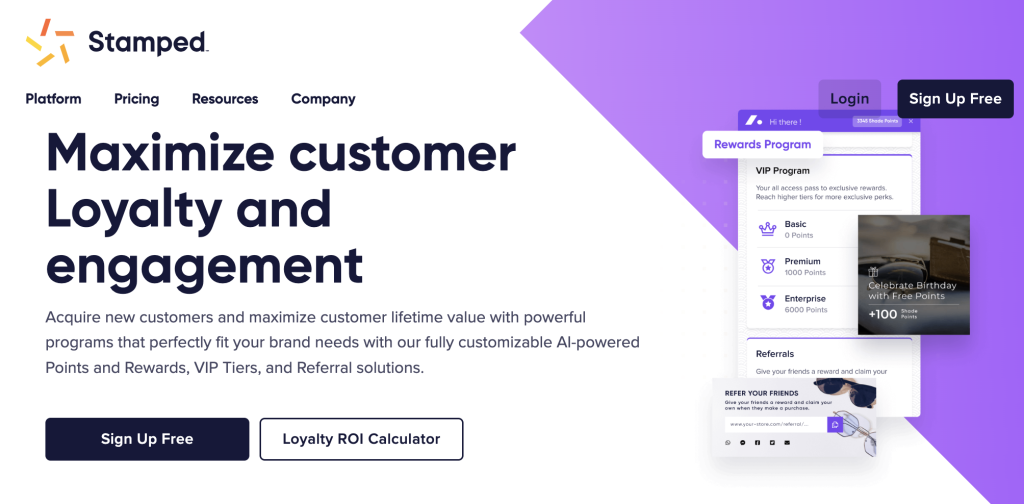
Its distinctive feature lies in its ability to collect and showcase authentic reviews, photos, and videos, and with its automation capabilities, Stamped.io streamlines the process of collecting and managing reviews.
Oh and did we mention that the automation process also helps businesses create social proof by using this user-generated content? It does and it’s worth checking out.
Ecommerce Tool #32 – Yotpo Content Marketing Platform
Yotpo is a cloud-based content marketing platform that enables ecommerce businesses to collect user-generated content and use it for marketing.
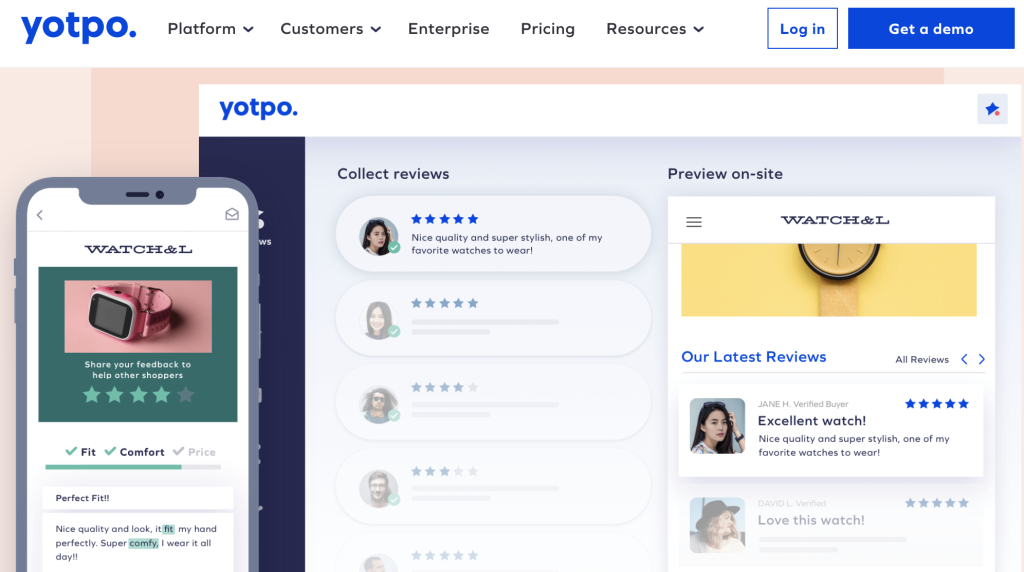
What we like about Yotpo is its seamless integration of reviews, ratings, and visual content throughout the customer journey. It uses AI to analyze customer feedback and then provides insights back to the business, enabling ecommerce businesses to optimize their strategies for increased sales and customer loyalty.
Yotpo does have a pretty comprehensive suite of tools beyond reviews, including loyalty programs, referrals, and social curation.
Ecommerce Tool #33 – Review.io Review Collect & Management
Reviews.io is a powerful review collection and management tool that helps businesses grow their online reputation.
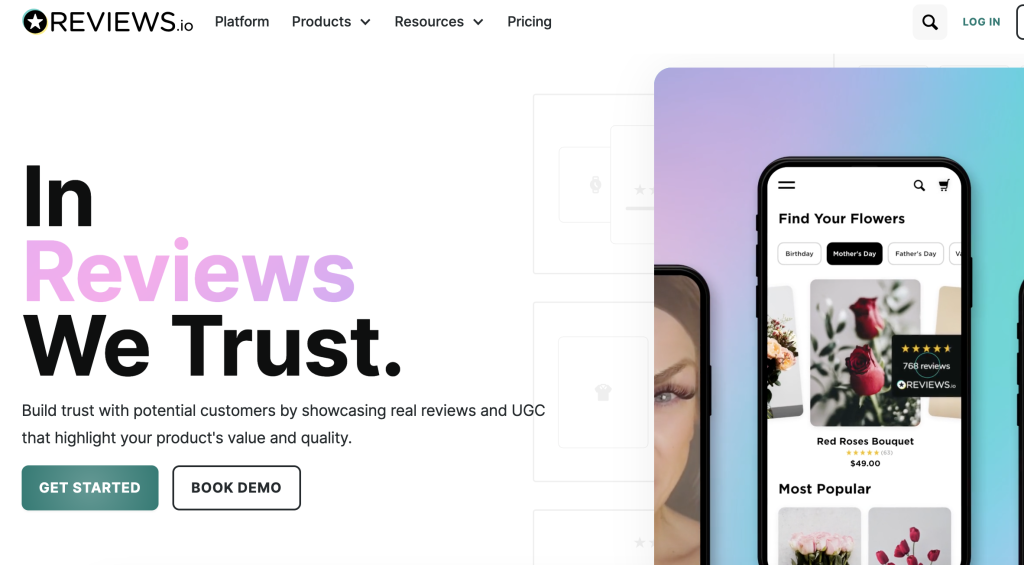
Review.io has a comprehensive and customizable review collection system that we love as it allows businesses to gather authentic reviews across various channels and put them in one place.
The platform’s advanced features, including sentiment analysis and review tagging, provide insights into customer sentiments and preferences, and the fact it simplifies the process of managing and leveraging reviews, makes it a top tool in our book.
Ecommerce Tool #34 – LoyaltyLion Loyalty Software
LoyaltyLion is a loyalty program software that’s built specifically for ecommerce stores. It allows you to reward customers for taking certain actions that help generate more brand for your online store.
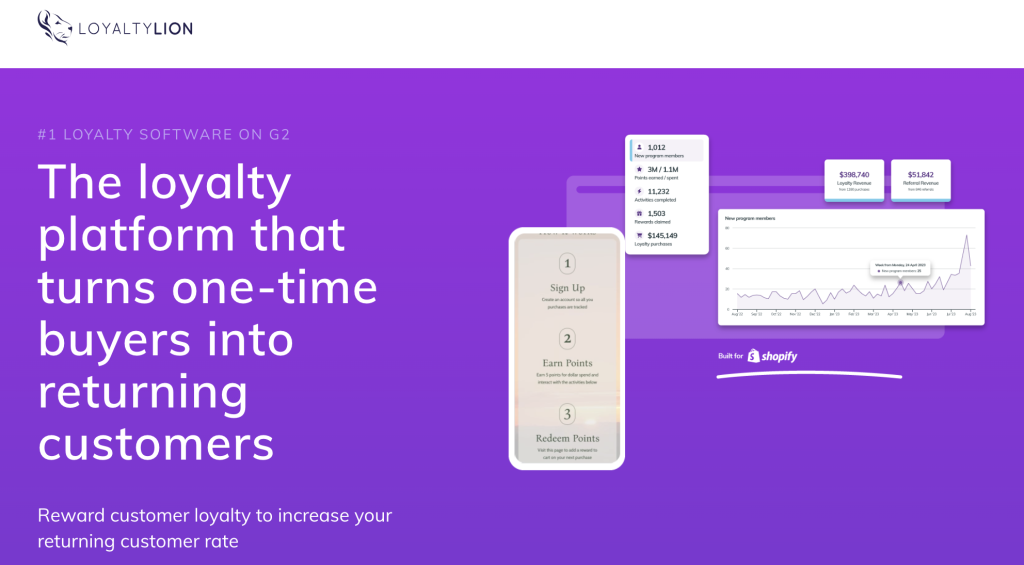
You can reward customers with LoyaltyLion for taking a number of different actions, such as likes and up-votes on social media, following your brand on Twitter and Instagram, birthday discounts, newsletter signups and more.
And this is what makes Loyalty Lion one of the best ecommerce marketing tools. By offering rewards for so many different types of actions, you can choose to incentivize customers to take the actions that you most want them to take.
Ecommerce Tool #35 – Smile.io Loyalty App
Smile.io is an ecommerce marketing tool that helps to build a community around your brand. You can use it to encourage customers to join, engage, and share your brand messaging.
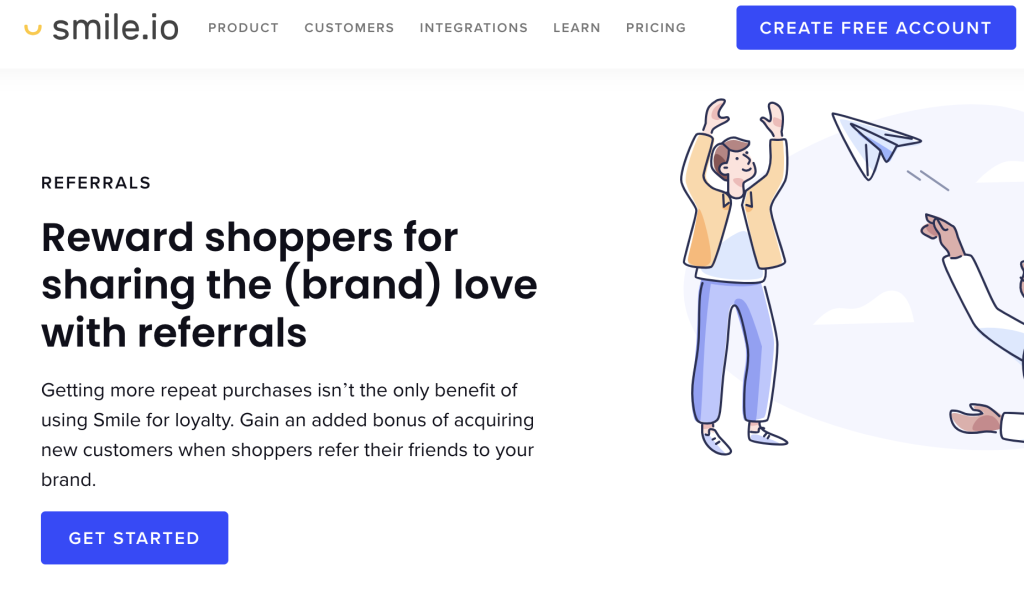
Use Smile.io to reward your customers with points as a way to establish and maintain lasting, emotional relationships with every member of your community.
Your customers become increasingly valuable as they shop and engage with your brand. Smile.io’s VIP program allows you to strengthen connections with your top customers through increasing rewards, statuses, and perks.
Lastly, Smile.io also has referral tools you can use to mobilize your best customers to refer like-minded people to your brand, effectively growing your community without any additional costs.

See Who Is On Your Site Right Now!
Turn anonymous visitors into genuine contacts.
Try it Free, No Credit Card Required
SEO Tools
SEO tools aid in optimizing online visibility by analyzing and improving website performance, keyword strategies, and overall search engine rankings, ensuring a competitive edge and driving organic traffic to ecommerce sites.
Ecommerce Tool #36 – Semrush Digital Marketing Solution
Semrush is an all-in-one digital marketing solution that helps companies run digital marketing campaigns including SEO, paid media, and content marketing.
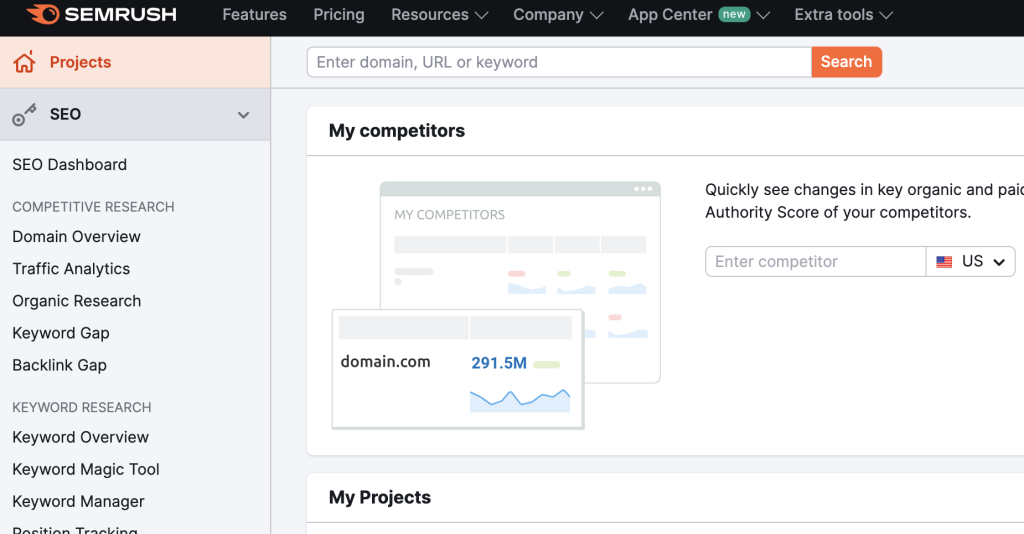
When it comes to SEO, what makes Semrush unique is its ability to provide in-depth keyword research, competitor analysis, and site audit capabilities. And with robust features like backlink analysis and rank tracking, businesses can try to stay ahead in search engine rankings.
It also has a user-friendly interface and delivers actionable insights that can be implemented quickly. Semrush gives marketers the tools to make good SEO decisions.
Ecommerce Tool #37 – ahrefs SEO Suite
Ahrefs is an SEO software suite with tools for link building, keyword research, competitor analysis, rank tracking, site audits, and more.
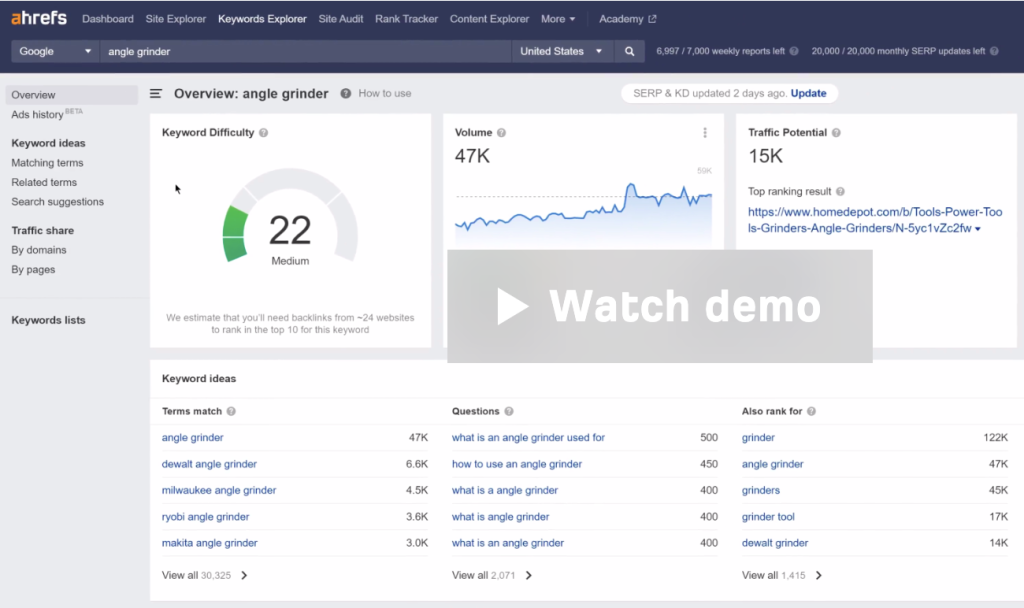
What sets Ahrefs apart is its extensive database and real-time data along with its ability to offer comprehensive backlink analysis, competitor research, and keyword tracking.
Ahrefs also will identify areas for improvement and provide actionable insights based on that data. Its user-friendly interface make Ahrefs a valuable asset for ecommerce businesses.
Ecommerce Tool #38 – QuestionDB Keyword Question Tool
QuestionDB is a keyword question tool that lets you search a massive collection of user questions to understand what people are asking and get original ideas for new content.
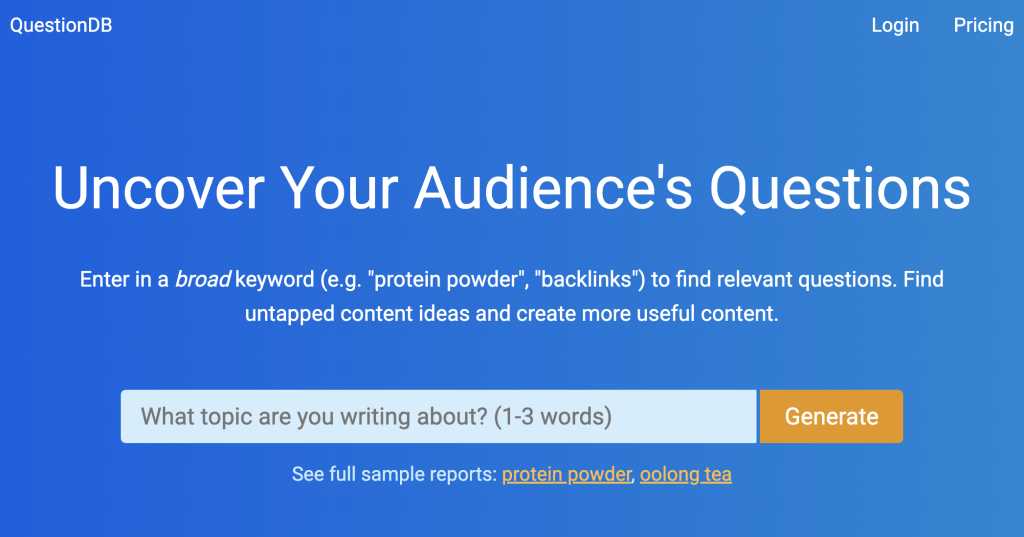
QuestionDB.io aggregates questions from online platforms like Reddit and Quora to help you understand what people are talking about and what questions they are asking.
What makes QuestionDB.io exceptional is its ability to identify trending topics and questions within a specific niche, enabling ecommerce businesses to tailor their content strategies to address customer queries effectively.
Customer Service Tools
Customer service tools help businesses manage and enhance customer interactions, resolve queries, and build lasting relationships, ensuring a positive and seamless experience that fosters loyalty and satisfaction.
Ecommerce Tool #39 – Gorgias Helpdesk Software
Gorgias is a helpdesk designed for ecommerce businesses that provides multichannel customer service from a single app.
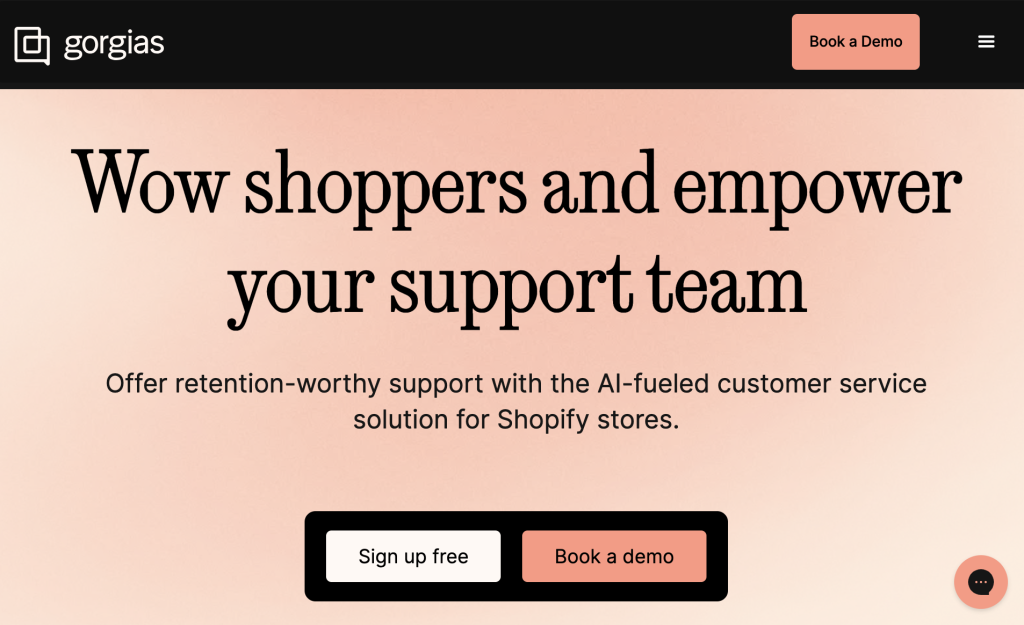
We like that Gorgias is designed specifically for ecommerce businesses, offering a unique combination of automation and personalized customer service.
What sets Gorgias apart is its ability to integrate with multiple ecommerce platforms, consolidating customer interactions and order information in one unified dashboard. Plus, the platform’s AI-powered automation assists in resolving routine queries, allowing customer service teams to focus on more pressing and complex issues.
Ecommerce Tool #40 – HelpScout Customer Support Platform
Help Scout is a cloud-based help desk software that includes an email-based customer support platform, knowledge base tool, and more.
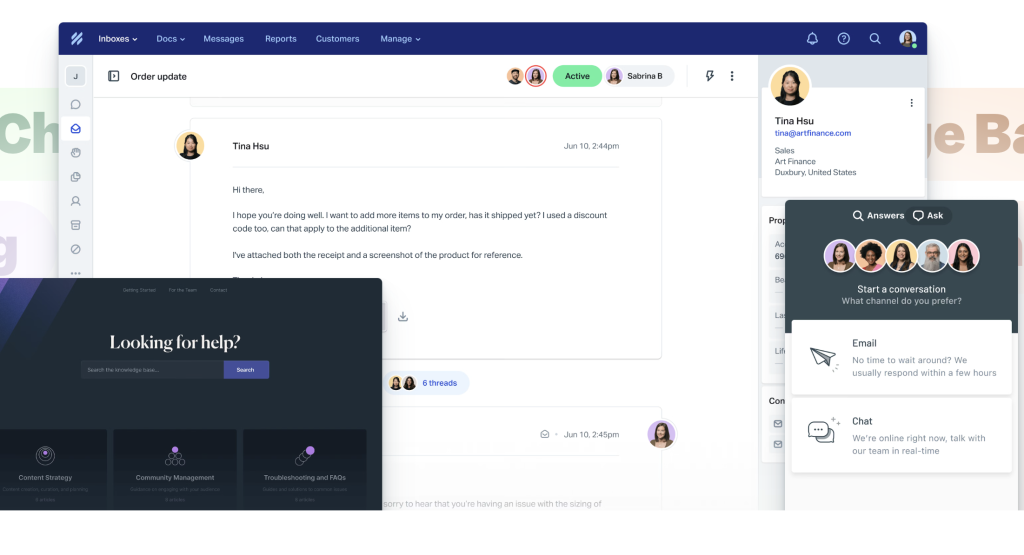
Help Scout’s customer service software stands out for its simplicity and focus on collaborative support.
What makes Help Scout unique is its shared inbox and collaborative features, allowing customer support teams to work together to resolve queries efficiently. Additionally, features like automated workflows and reporting give the ability to provide more personalized customer service.
Ecommerce Tool #41 – Groove HQ Help Desk Software
GrooveHQ is a help desk platform meant for small businesses and startups and focused on the idea of the ‘team inbox’.
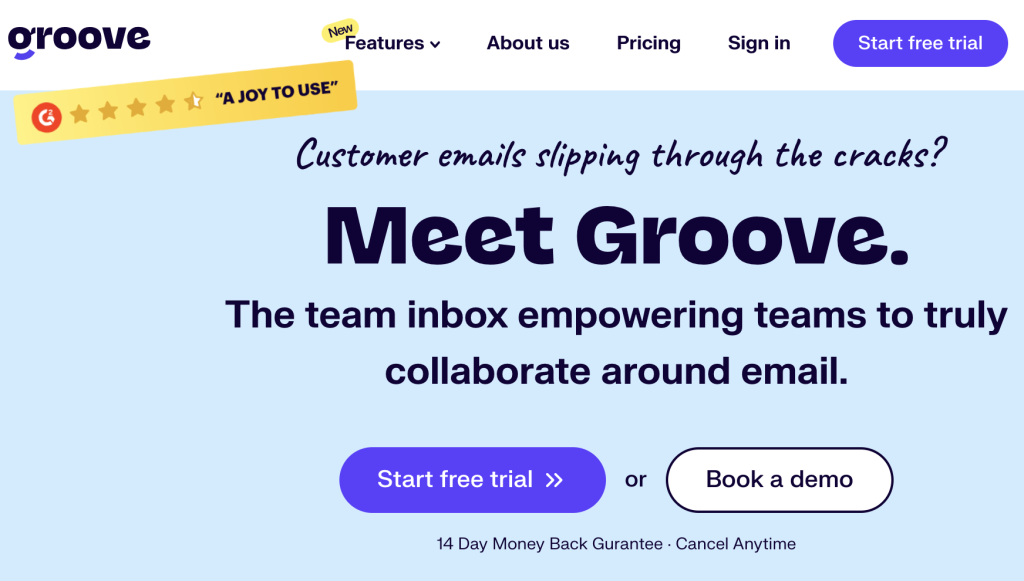
We like GrooveHQ because of its simplicity, scalability, and collaborative features, all of which make it an excellent choice for ecommerce businesses.
What sets GrooveHQ apart is its shared inbox, automation capabilities, knowledge base management, in-depth analytics, and the ability to provide personalized customer service.
Ecommerce Tool #42 – Drift Chat Platform
Drift is a live chat, in-app messaging, and email management solution designed for sales and marketing teams.
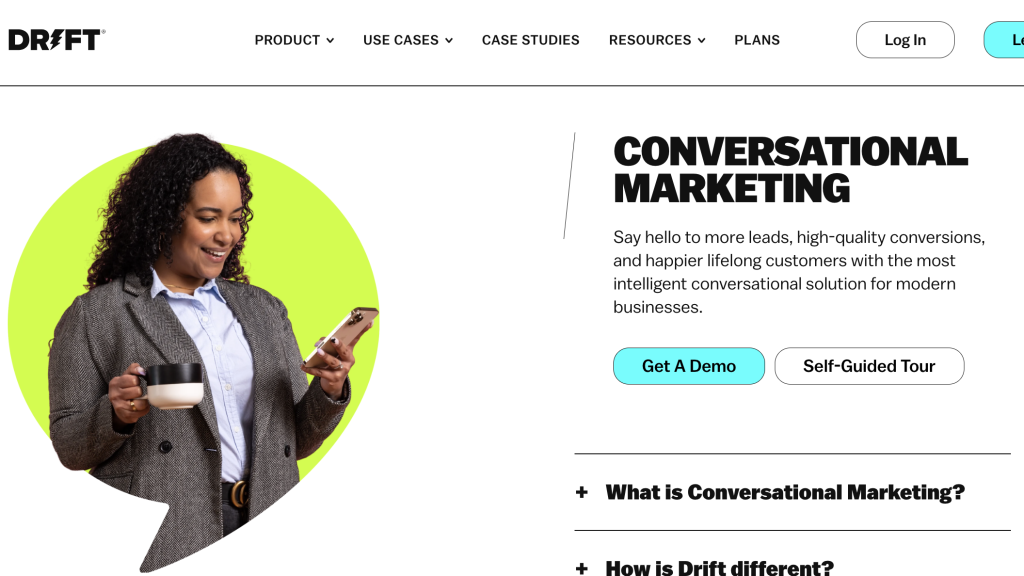
Drift’s live chat software stands out for its conversational marketing approach and focus on real-time conversations.
We also like Drift for its focus on B2B and SaaS, which includes combining data from your business software (CRM, sales and marketing tools, etc) to identify web visitors and better personalize interactions.
PR & Media Tools
PR and media tools are a must for managing and optimizing public relations efforts, media outreach, ensuring effective communication, positive media coverage, and driving brand visibility.
Ecommerce Tool #43 – Press Kit Hero
PressKitHero makes it easy to design a professional press kit for your ecommerce store.
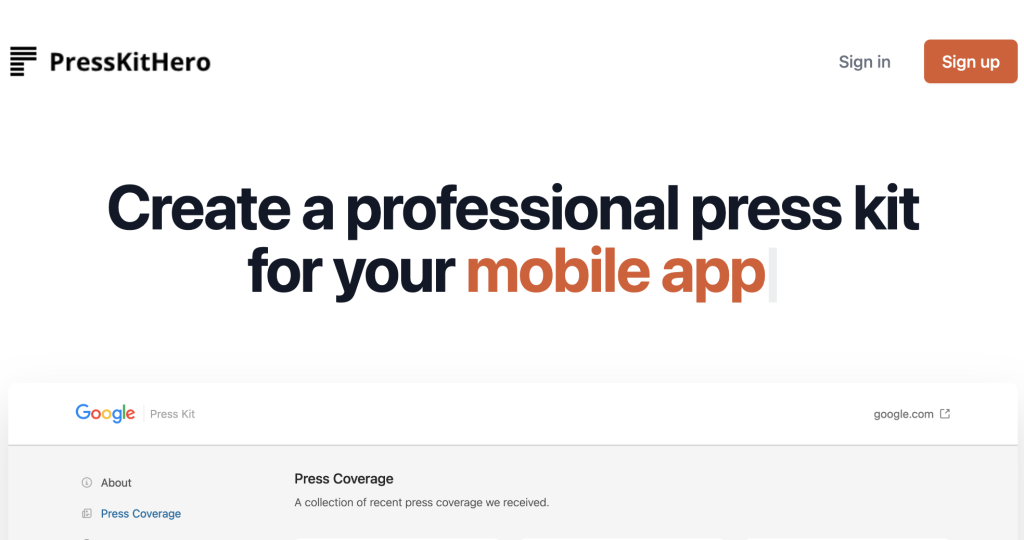
Press kits are a highly underrated tool for ecommerce companies to take advantage of. If you really want your product to catch fire, the media needs to know who you are and what you do.
PressKitHero enables you to showcase all of your accomplishments, awards, testimonials, and press releases in one place. Additionally, their easy to use dashboard makes it easy to organize and display professionally while saving you lots of time.
Ecommerce Tool #44 – Prowly Media Relations Software
Prowly is a Public Relations and Media software that manages internal and external communications, connecting all PR activities in one place.
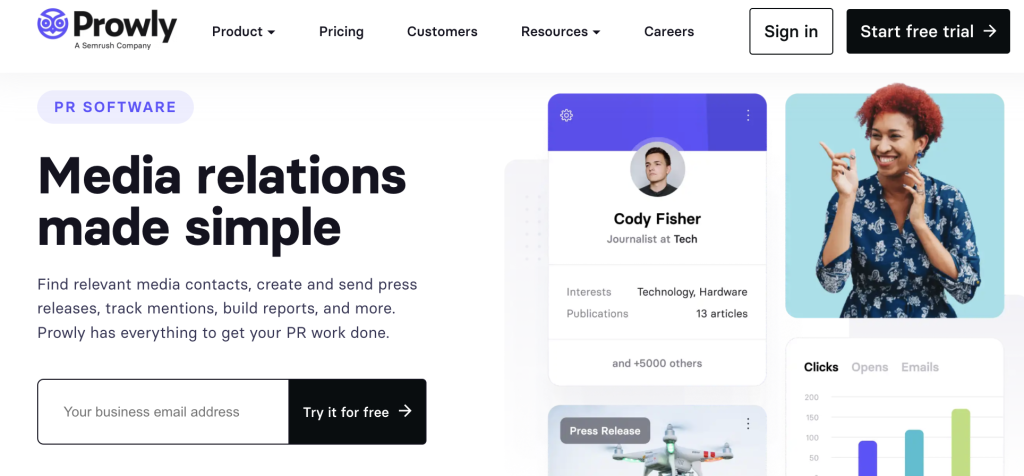
What makes Prowly unique is its intuitive interface, allowing businesses to create engaging press releases, multimedia materials, and interactive content for both their target audience and the media.
We also like the media database management and campaign tracking features which not only help streamline PR efforts but also build connections with journalists.
Ecommerce Tool #45 – Grammarly Writing Assistant
Grammarly is AI-based typing assistant that reviews spelling, grammar, punctuation, clarity, engagement, and more.
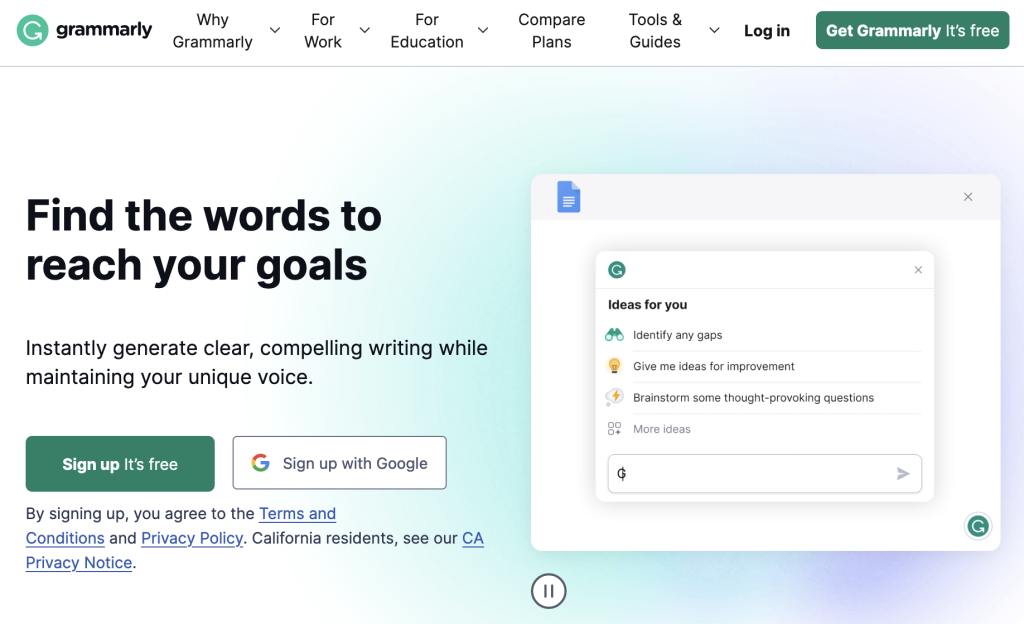
Grammarly excels in its advanced grammar checking, tone adjustment, and plagiarism detection, ensuring that product descriptions, marketing copy, and communications are error-free and maintain a consistent brand voice.
We also love that offers real-time suggestions and improvements, helping ecommerce businesses create polished, error-free content.
Ecommerce Tool #46 – JustReachOut PR Software
JustReachOut is a DIY PR solution that helps businesses find the most relevant journalists and pitch the most effective angles.
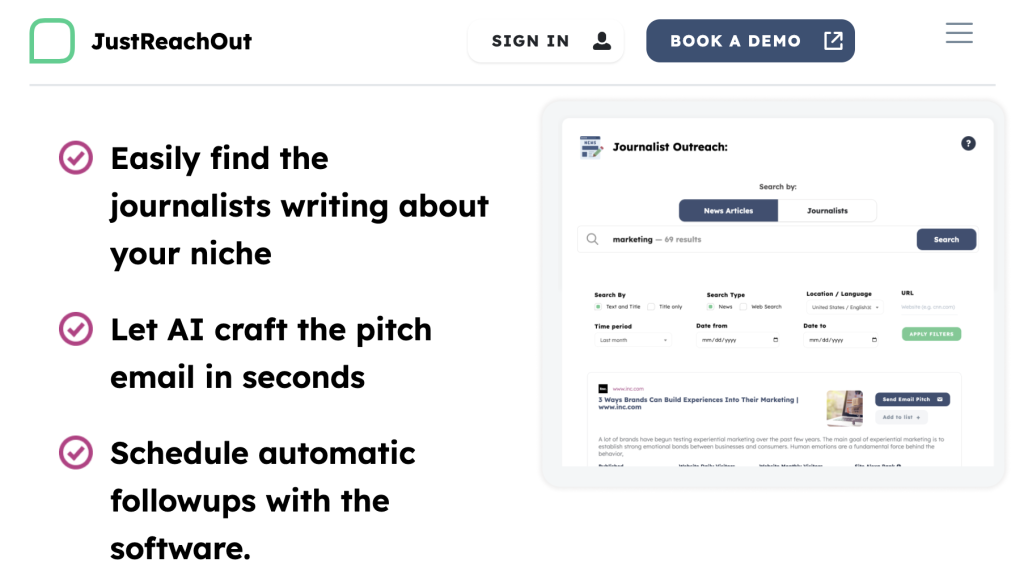
What sets JustReachOut apart is its focus on the basics – journalist preferences, contact details, and pitch messaging.
At a much lower cost than other PR tools, JustReachOut gives businesses the power to build and control media relationships, create personalized and targeted pitches, and secure press coverage.
AI-Powered Advertising
How to Unlock AI and Lead Capture Tech for 10X Return on Ad Spend


HOSTED BY
Larry Kim
Founder and CEO, Customers.ai
Social Media Marketing Tools
Social media tools give ecommerce businesses and efficient way to manage, analyze, and optimize their social media presence, enabling effective communication, brand promotion, and customer engagement in throughout the social media marketing world.
Ecommerce Tool #47 – Meet Edgar Social Media Scheduling Tool
MeetEdgar is a content recycler that can be used to automate the sharing of all your evergreen content across Facebook, LinkedIn, Twitter, and Instagram.
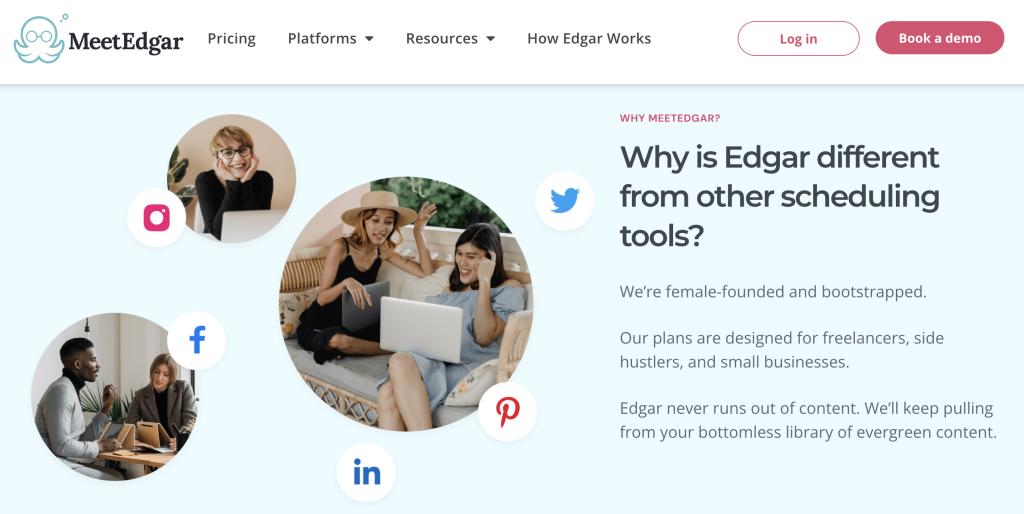
Unlike other content schedulers, you can load up MeetEdgar with all of your most important content once, and then have that evergreen content shared over and over again according to a schedule that you can edit.
We like that MeetEdgar helps promote your best content, on repeat, saves time on scheduling, and auto-generates and tests variations.
Ecommerce Tool #48 – Canva Photo Editing Software
Canva is a photo editing tool that you can use to quickly create graphics, presentations, posters, and other visual content for social media.
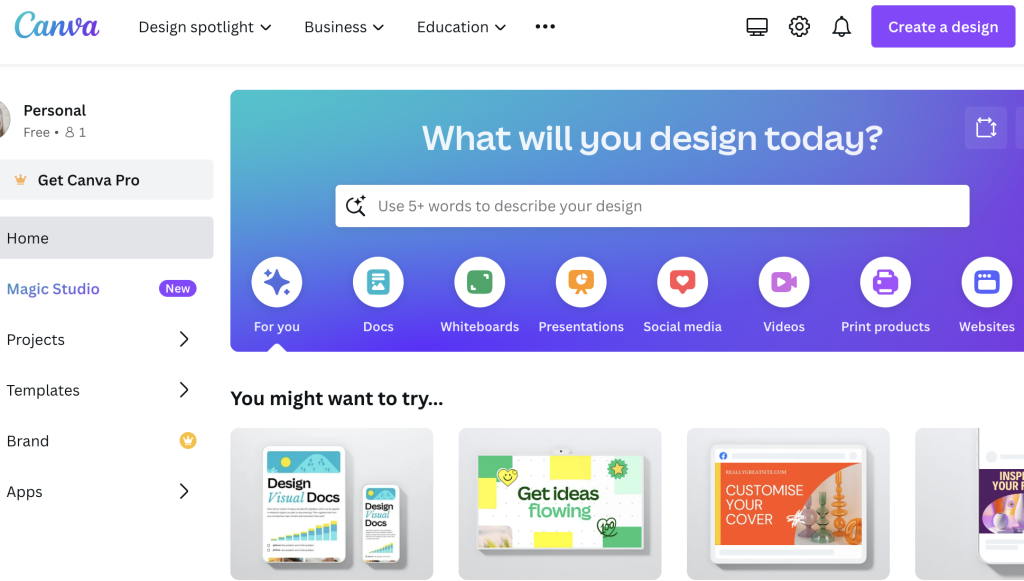
What we like is the visual content creator integrates millions of images, fonts, templates, and illustrations for marketers with little to no design skills to build professional-looking images and has pre-built templates for all of your favorite social media channels.
Canva is super easy to use and makes social media posts much more interesting.
Ecommerce Tool #49 – AgoraPulse Social Media Management Software
Agorapulse is an all-in-one dashboard for social media management that simplifies the understanding of social media metrics.
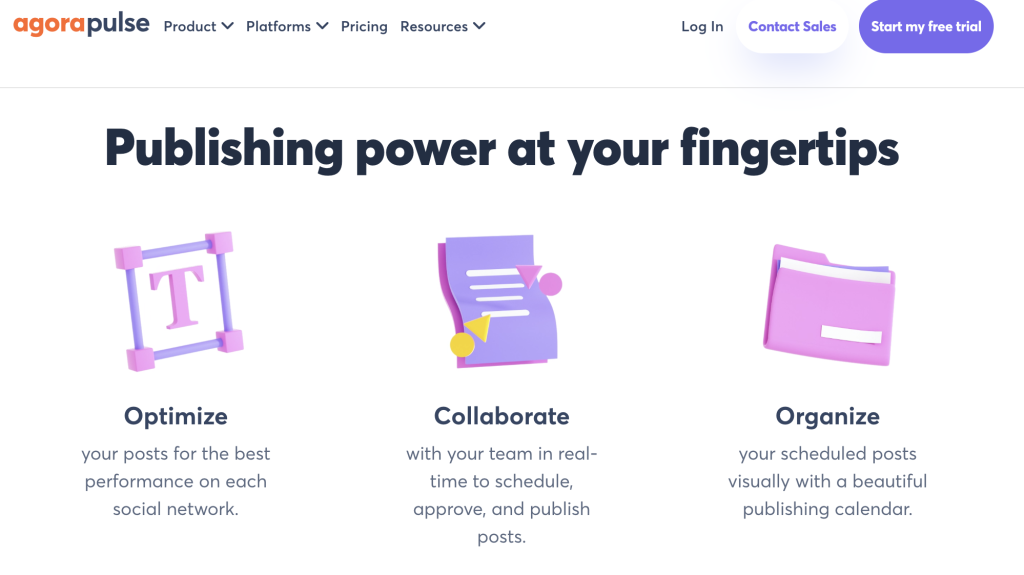
We like that with the AgoraPulse monitoring and engagement capabilities, you can gain audience insights and take advantage of otherwise missed opportunities.
Additionally, AgoraPulse has lots of options to build a pipeline for your content calendar, allowing you to store unlimited posts tied to particular themes, and queue them up for publishing.
Ecommerce Tool #50 – Instachamp Automated Social Media Messaging
InstaChamp is the first Instagram-and-Facebook approved tool for business growth via messaging automation.
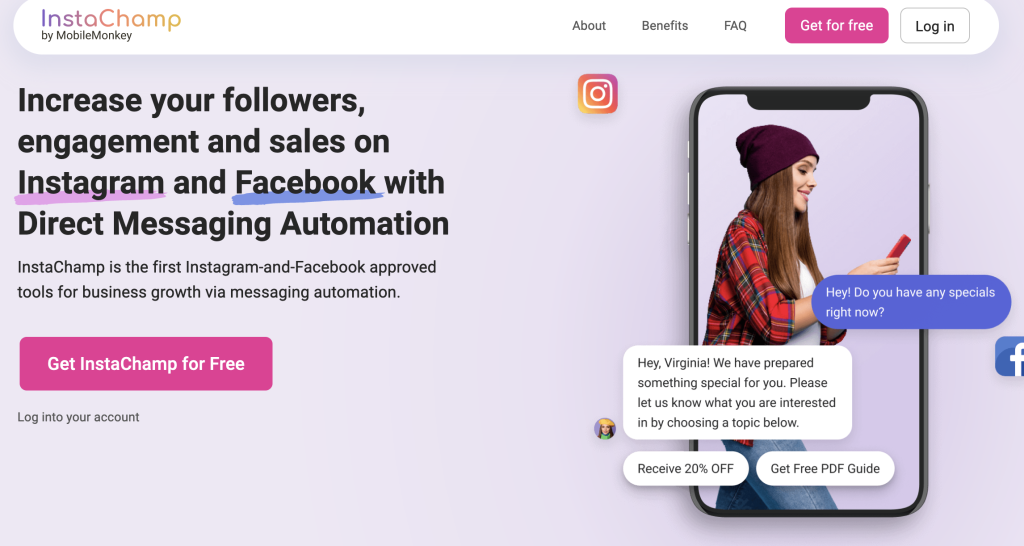
InstaChamp stands out for its comprehensive approach to social media engagement, particularly tailored to ecommerce businesses. What makes InstaChamp unique is its advanced automation features, including chatbots and personalized messaging, which facilitate instant and personalized interactions with customers.
Plus, by automating responses, customer queries, and order updates on social media platforms, InstaChamp helps ecommerce businesses enhance customer satisfaction, streamline communication, and improve conversions.
Get Started Building Your Ecommerce Tech Stack
Ecommerce tools are invaluable assets that streamline operations, enhance customer experiences, and optimize marketing strategies, empowering ecommerce businesses to thrive in the competitive online landscape and achieve sustained growth.
As you build your ecommerce tech stack, consider which tools are right for you. Cost, flexibility, use cases. It’s important the tools you choose fit your business and help you grow.
Important Next Steps
- See what targeted outbound marketing is all about. Capture and engage your first 500 website visitor leads with Customers.ai X-Ray website visitor identification for free.
- Talk and learn about sales outreach automation with other growth enthusiasts. Join Customers.ai Island, our Facebook group of 40K marketers and entrepreneurs who are ready to support you.
- Advance your marketing performance with Sales Outreach School, a free tutorial and training area for sales pros and marketers.
Convert Website Visitors into Real Contacts!
Identify who is visiting your site with name, email and more. Get 500 contacts for free!
Ecommerce Marketing Tool FAQs
Q: What are the essential ecommerce marketing tools?
Essential ecommerce marketing tools include email marketing platforms, social media management tools, SEO tools, and analytics software. To streamline team collaboration, the right project management tool or task management software is also essential.
Q: How can ecommerce businesses benefit from marketing automation tools?
Marketing automation tools help streamline repetitive tasks, personalize customer experiences, and improve overall efficiency in running marketing campaigns.
Q: Which ecommerce platforms integrate well with marketing tools?
Popular ecommerce platforms like Shopify, WooCommerce, and Magento often integrate seamlessly with a wide range of marketing tools.
Q. What types of packaging and shipping tools do you recommend for ecommerce?
There are a number of solutions out there when it comes to shipping your ecommerce products. One that we like due to it’s flexibility and design is Arka.
Q: What role do CRM tools play in ecommerce marketing?
Customer Relationship Management (CRM) tools help businesses manage customer data, track interactions, and personalize marketing efforts to improve customer relationships.
Q: How can social media marketing tools boost ecommerce sales?
Social media marketing tools assist in scheduling posts, analyzing engagement, and targeting specific audiences to enhance brand visibility and drive sales.
Q: What are the best practices for email marketing in ecommerce?
Best practices include segmenting email lists, personalizing content, optimizing for mobile, and analyzing metrics to continually improve campaigns.
Q: How do SEO tools contribute to ecommerce success?
SEO tools help optimize product pages, improve site structure, and enhance overall online visibility, leading to increased organic traffic and sales.
Q: What role does content marketing play in ecommerce strategy?
Content marketing builds brand authority, educates customers, and attracts organic traffic, ultimately driving conversions and fostering customer loyalty.
Q: How can ecommerce businesses leverage influencer marketing tools?
Influencer marketing tools assist in identifying influencers, managing collaborations, and tracking performance to amplify brand reach and credibility.
Q: What are the key features to look for in ecommerce analytics tools?
Key features include conversion tracking, customer journey analysis, real-time reporting, and the ability to measure ROI across multiple channels.
Q: How do A/B testing tools benefit ecommerce websites?
A/B testing tools enable businesses to experiment with different elements on their websites, helping them identify the most effective strategies for improving conversions.
Q: What is the impact of mobile marketing tools on ecommerce?
Mobile marketing tools optimize campaigns for mobile devices, enhance user experience, and capitalize on the growing trend of mobile shopping.
Q: How can ecommerce businesses use retargeting tools to recover abandoned carts?
Retargeting tools track users who abandon carts and display relevant ads, encouraging them to return and complete their purchase.
Q: What role does user-generated content play in ecommerce marketing, and are there tools to manage it?
User-generated content enhances authenticity, and tools like social media aggregators help businesses curate and display this content on their websites.
Q: How do loyalty program tools contribute to customer retention in ecommerce?
Loyalty program tools incentivize repeat purchases, reward customer loyalty, and foster long-term relationships by offering exclusive benefits.
Q: Can ecommerce businesses benefit from chatbot tools?
Chatbot tools enhance customer support, provide instant assistance, and guide users through the purchasing process, improving overall user experience.
Q: What are the advantages of using affiliate marketing tools in ecommerce?
Affiliate marketing tools help businesses partner with affiliates to promote products, expanding reach and driving sales through performance-based commissions.
Q: How do ecommerce businesses ensure GDPR compliance with their marketing tools?
Ecommerce businesses can ensure GDPR compliance by obtaining user consent, securely handling data, and regularly updating privacy policies in collaboration with their marketing tools.
Q: How can ecommerce businesses use video marketing tools effectively?
Video marketing tools enable businesses to create engaging product videos, tutorials, and testimonials, enhancing the overall online shopping experience.
Q: What are the cost considerations when investing in ecommerce marketing tools?
Consideration factors include subscription costs, scalability, and potential additional fees for features or integrations, ensuring alignment with the budget and business goals.
